#as walter white orders the death of another person 'for his family'
Text
obsessed with villains who you just KNOW are aware deep down in their heart that they've done something unforgivable, but the only way to never admit that or face the guilt is to keep doing it over and over again until they don't feel guilty about that first time anymore
#sky speaks#i am contemplating walter white and phillip wittebane#if i never admit it even to myself#then i can go on living like this forever#phillip says as he kills his brother again#as walter white orders the death of another person 'for his family'#and sure they do LIKE the power#but i just knowww it burns sometimes
35K notes
·
View notes
Text
Call Me Back
Pairing: Wanda Maximoff x reader
Warnings: death, a small sexual innuendo, and lots of commas and long sentences
Word Count: 3.4k
Summary: You and Wanda promised each other you would always call to check in, and Wanda’s going to do her best to keep that promise, no matter what.
The first time you met Wanda was… well, when was the first time you met Wanda? Was it when wisps of red flashed in front of your eyes, projecting images so horrific and lifelike that you all but collapsed in a heartbeat? Or was it when she stepped forward to shake your hand timidly, grief and determination filling the witch as she promised to make up for it?
“I- I wouldn’t have done it if I… we were just trying…”
“Don’t worry about it,” you had told her with a smile before confiding in her about your own missteps, how you’d wreaked havoc on all of New York with your powers of body modification after your own parents died, how Fury finally got the Avengers to catch you, and how they quickly became your new family.
-
“You mean they really almost burned the kitchen down trying to make you a birthday cake?” The brunette giggled later that night as you recounted the story of your sixteenth birthday, the two of you sitting comfortably beside each other on the living room sofa.
“Yup. And when Nat showed up with an ice cream cake fifteen minutes later to find smoke in the living room, Sam told me she freaked on everyone.”
“Excuse me, Y/N, I did not do any ‘freaking.’ God, is that what you teenagers are calling it now?” The two of you erupted into laughter, and the redhead could do nothing more than shake her head, a smirk playing on her lips no matter how hard she tried to conceal it.
---
Much like Nat and Steve predicted, the two of you became fast friends. You sat next to each other on movie nights, sang karaoke in your room when you thought everyone else was asleep (if they weren’t awake when you started, they certainly were once you were thirty seconds into Whitney Houston’s “I Wanna Dance With Somebody”), and, much to Steve’s dismay, when you finally became confident with your ability to grow wings on your back, snuck out regularly for late-night flights around the compound.
But you also insisted on being there for Wanda’s training sessions, even if it meant you had to wake up an hour earlier. You cradled the witch in your arms when she woke up night after night with an aching hole in her heart before you eventually insisted you guys just share a room. And you promised her, above everything else, that when you went out for anything, whether it be a quick grocery run or a month-long mission, you’d let her know you were okay.
You knew the promise she pleaded you to make was a result of the anxiety she suffered. She’d lost everyone she cared about; if a simple text or call was enough to put her at ease, you’d do it in a heartbeat.
---
“Wanda,” you’d whispered, the teen immediately sitting up straight when she’d heard the cracks in your voice. “I- I don’t know what to do. I’m safe, but...” She told you to stay there, don’t move, she’d be there in minutes. And, with your brain unable to function enough to think of any other option, you listened.
Her heart broke at the sight of you, your arms wrapped tightly around yourself and your head hung, you feet occasionally kicking the wet sidewalk. The neon sign of the restaurant your date had promised to meet you at illuminated one side of your face, allowing her to see the tears that you had tried but failed so desperately to hold in. But the witch didn’t let you see her emotions, instead whisking you away from the unfamiliar section of the city, brushing the tears off of your cheeks and bringing you to the twenty-four-hour diner for milkshakes. She made a fool of herself in front of the waitstaff until tears flowed from your eyes once again, but this time, the crystalline drops rolled down your raised cheeks, aching from smiling too hard.
-
When you had a panic attack during training because you couldn’t get one of your body modification attempts to reverse—”Wanda, I cannot be stuck with claws for hands, I can’t!”—she refused to let you hang up until the steady sounds of her own breathing calmed you down, the sharp nails receding and making way for the soft pads of your very human fingertips.
-
And when she called you after the mission in Lagos, you worked tirelessly to complete your own solo mission as soon as you could. You returned to the tower to find her holed up in the bedroom, news broadcasts playing nonstop on the television to remind her of the horrors she’d committed; accident or not, she told you, she needed to hold herself accountable. You simply shook your head at her, holding out your hand without another word. She didn’t take it at first.
“You can’t fix it, Y/N. I’m sorry. I shouldn’t have called you.” She was expecting you to fight her back on it, yell at her and demand that she take your hand, or perhaps you’d go the complete opposite direction and leave her alone, let her be swallowed by guilt and anguish, rip open old wounds and form new ones as she thought of how she tore apart families that were probably much like her own. You did neither.
Wanda’s green eyes remained fixed on your outstretched hand. You stayed silent, one eyebrow cocked as if daring her to see what would happen should she choose not to take it. It was only then that she realized, for once in her life, the person she most loved wasn’t leaving; the support she so desperately needed wouldn’t be yanked away from her when it was mere centimeters from her grasp.
So she rested her fingers in the palm of your hand, and you pulled her out to the balcony where the two of you had spent night after night watching the stars instead of sleeping, making up funny names for each of them and rolling in fits of laughter that only came to those delirious and sleep-deprived enough to understand just what was so funny. Except, this time, instead of dropping into the oversized beanbag chair that was the usual spot of your stargazing shenanigans, she watched curiously as you removed your shirt. Her mouth dropped as you closed your eyes and allowed the white feathers to emerge from beside the ridges of your spine. Although it was a process she’d seen several times before, your modifications had never ceased to amaze her, and your angel-like wings had always been her favorite. The witch admired the additions as you allowed them to flap slowly, once, twice, before turning back to her.
“Let’s go,” you finally spoke, the order gentle but leaving no room for negotiation.
“Where are we going?”
“Away.” That was enough for the brunette, who squeezed your hand before following your lead. She allowed you to guide her through the maze of clouds and couldn’t help but smile softly as the sun’s rays hit your face at just the right angle. You wore the exhaustion from your recent mission on your face, and streaks of dirt covered the bruises that she was sure littered your body. But she was content, in awe, because you were you. You didn’t put up walls to hide your scars from the world, didn’t use passive-aggressiveness to hide the passion that burned in your heart. At the end of the day, you were good, purely and truly good. You were an angel; even the sun knew it.
What Wanda didn’t realize, but what you taught her that night, as she sat surrounded by sunflowers, the moon, thousands of gleaming stars, and the tickle of your feathers as your wing pulled her close to you, was that she was one too.
“I’m glad you called me,” you whispered, your eyes not leaving the open sky as you pointed out a particularly bright spot. “I’m gonna call that one… Philip. He looks regal, real proud. Look at him, so much brighter than the others, and he knows it too.” The witch breathed out a soft chuckle, stroking her fingers over your feathers as she responded.
“I’m glad I called you too. And I think Philip is a good name for him. What about that one?”
“Hmm… Walter? He’s a bit more serious, I think. But you see the one next to him?” You waited until you got a nod from the girl before continuing. “That’s his sister. She makes sure he has fun, even when he says he doesn’t want to. But you name her, Wands. Naming stars is a two-person job, you know.” She squeezed the elbow that you nudged her with before giving in.
“Alright… that’s Delia. And, yeah, she’s the best. The life of the party. Walter keeps her grounded, though,” Wanda added, to which you agreed to with a hum. You two fell quiet after that, enjoying the comfortable silence and looking up at the twinkling lights, some of them gaining names and stories, others waiting to be named another night.
“Wanda?”
“Yeah?”
“You call me if you ever need me, okay? I know we started this with me calling you, but I’m here for you too.” The witch met your eyes with a firm bob of her head, but you continued, desperate to make sure she understood. “And if I don’t pick up at first, you call me back, okay? Call me until I respond, promise?”
“I promise,” Wanda soothed gently. “I will.”
“Okay, good, good. Because,” Wanda felt a brush of your feathers against her upper arm as you fluttered your wings, slightly agitated, “because I think I love you. I mean, um, I know. I know I love you. I love you. Yeah, I-” Wanda shut you up with a kiss, her lips pressed urgently against yours. And if you hadn’t lost your breath from your rambling or your declaration of love to the girl of your dreams, then you most definitely lost it as your lips melted into hers, in the comforting warmth of her palm against your cheek, and in the words that left her mouth as you finally pulled apart, breathless.
“I will, Y/N, I promise. Because I love you too.”
---
People thought you were inseparable before you started dating, but they all realized how wrong they were after that night. The two twin beds quickly became a queen-sized mattress, sideline support during training sessions became fierce yet playful spars, and the private giggles you guys shared grew tenfold. Fury wasn’t exactly happy that his unofficial daughter was now dating, but he was pleased by how efficiently the two of you worked together, which led you to this moment, the two of you covering the Quinjet while waiting for the rest of the Avengers to finish their business inside the massive Hydra base. With Wanda covering the ground and you in the sky, flying with the white-feathered wings that Wanda loved so dearly, the two of you held off the swarms of Hydra agents relatively well. With a small break in between incoming agents, Wanda looked up to check on you, but she was a moment too late. Before she could even think to warn you, the pure feathers she loved to brush her fingers through fell from the sky, the white stained with red, your screams ripping through her eardrums.
No one, including Wanda, had time to think as she exploded with a new rage, one that hadn’t run through her in years. One that she hoped she would never experience again, but here she was. And there you were.
While you were held in the air by her signature red mist, the opposing agents fell to the ground. She didn’t care about their screams, only yours. And with them all dealt with, she could turn to you, rushing you both into the Quinjet and yelling for the other Avengers to get back here, now.
But her efforts were futile. She could press down on the wounds all she wanted, beg for you to come back until her voice was nothing more than a whisper, but nothing would work. You were gone the instant the missile had hit you, and as much as Wanda wanted to deny the truth, she knew it just as much as your other teammates did when they rushed onto the Quinjet. You were gone before you could say a single goodbye.
---
The first time Wanda called was from your shared bedroom. She dialed your number before tracing the pillow where your head would have laid, running her fingers over the cartoon carrots that covered the comforter. The yellow bedding set was a gag gift Tony had gotten the two of you when you got your new bed.
“You know, since I figure the two of you will be going at it like rabbits,” he winked before getting immediately smacked in the back of the head by Steve.
“They will be doing no such thing,” the supersoldier had chastised him with a roll of his eyes. “God, Stark, sometimes I forget you have a brain when you say such stupid things.”
But you loved it, telling Wanda, “The carrots remind me of you, Bunny.” And how could she return the present when you were being so sweet about it? But the sheets didn’t make her smile in the same way they once did because you were gone. No one was there to tease her about the way her nose wiggled much like the little white fluffy creatures or promise to get her carrots from the market the next day.
The call went to voicemail, and as bittersweet as it was, Wanda savored it because it was you. Your voice. But the beep came far too soon, and your turn was done. So she spoke.
“Y/N, hey, it’s me, Wanda. I, um, I love you. I’ll always love you, yeah?” The witch put the phone down, thinking that was all she could bear to say as the lump in her throat ballooned in size and hot tears filled her eyes. But just before time was up, her hand shot up to press the device against her ear again. “Call me back, milaya.”
---
The second time Wanda called was from the balcony. The brunette eyed the sparkling diamonds that filled the sky, wondering how you could be gone when, the last time she was here, you were right there beside her, laughing over the boys’ latest shenanigans and Ned, the newly named star.
Now, the beanbag chair felt too big, too empty without another person sitting next to her. Without you. So she dialed your number, the only number she bothered to learn by heart, and waited for the dulcet tones of your voice. As the dial tone rang, she ran one hand over the white feather that laid gingerly in her lap. Natasha had given it to her along with several others a few days after your death. Each of the team members had one to remember you by, but the spy had picked out the biggest and most brilliant ones to give to Wanda.
“I know how much her wings meant to you-” Natasha stiffened as Wanda threw her arms around her. But the witch didn’t care, her tears soaking the redhead’s shirt as she tried to find the words to thank her. She couldn’t, but it was okay. Natasha knew anyway. Wanda had little time to reflect on the memory before her face brightened at the sound of your voice.
“Hi, this is Y/N-
“And her girlfriend, Wanda! She’s taken, so don’t even think about it, you jerk!” Wanda smiled slightly at your jubilant laughter, remembering how you’d pushed her away for interrupting you.
“I’m not available right now, but leave me your name, number, and message and I’ll call you back as soon as I can, okay? Talk to you soon.” The witch’s eyes closed slightly as the greeting ended with a spell of your giggles before it was interrupted by that damn beep. God, how she hated that beep. Nevertheless, she took a breath and spoke out into the clear night sky, looking up at the stars as she did so.
“Hi, lyubov moya, it’s me. Wanda. I’m calling you back, just like you told me to. I’m not okay. I need you. I love you.” Her breath caught in her throat, forcing her to pause for a moment, but she forced herself to keep going a second later. “Sam and Bucky did the stupidest thing today. Nat and Steve were all over their asses. You should’ve seen it. I miss you. Please, call me back. I’ll tell you all about it.”
---
The last time Wanda called was from the sunflower field. The two of you hadn’t been here since the night you told her you loved her. In fact, it took Wanda several hours to find it since she hadn’t been paying much attention to the route the first time you came.
Once again, the night was clear, the stars lighting up the dark canvas with their radiance. She missed the feeling of your wing wrapped around her, of your presence next to her. But she had one of your feathers in her fingers and your voice in her ear, and to ask for more would be greedy, right?
“Hi, angel. It’s Wanda. I’m calling you back to leave a message, but I can’t do it again after this because I don’t want your voicemail to fill up, okay? I’m sorry, I know I’m being selfish, but I need to be able to hear your voice, so I can’t let it fill up. But I haven’t forgotten you, I promise I haven’t. I never will. I’m still-” Wanda swallowed, a fighting effort to calm the waver in her voice. “I’m still not okay, but I’m trying. For you. But I’m not okay, I need you to call me back. I’ve named one up there Halia, but her twin sister needs a name. And naming stars is a two-person job, you know.” The witch sniffed once as the corner of her lip curved up slightly, remembering the playfulness in your voice when you’d first said the line. “Call me back, Y/N, please.”
With the message over, Wanda clutched the phone to her chest, her breaths becoming faster and shallower as she closed her eyes, trying to accept the knowledge that it’d be the last time she’d ever leave a message, the knowledge that she was really losing you… the knowledge that she already lost you.
---
Months went by. Wanda wasn’t sure how they did, but they did. The first sign of it was the first Halloween without you, as she saw the other couples dressing up in matching costumes that you would’ve loved, costumes you would’ve pointed out to Wanda with an excited bounce and told her you’d have to wear next year. The next was Thanksgiving, when Wanda ran through the list of everything she was thankful for and came up short when she thought about the people she still had left. And then it was Christmas, and Valentine’s Day, and the first day of summer.
And while Wanda did her best to move on, she always found herself under the stars, dialing your number. She sat on the balcony, in the sunflower field, wherever she could see the sky, and she listened to your voice telling her that you’d call her back as soon as you could, always forcing herself to hang up a second before the beep could cut you off. Wanda named every other star she saw, leaving the ones in between for you and hoping that you’d approve of the names she chose.
“I’m naming that one Angel for you, Y/N,” Wanda murmured. “It’s even brighter than Philip. It’s the brightest star in the sky. I know you think it’s silly to name things after people, but this one’s just special, so you’re gonna have to make an exception, okay?” The brunette’s lips stopped moving, but her eyes stayed wide open as she watched the star as if, if she watched it long enough, studied it hard enough, you would materialize from its luminescence. As if you would come back to her. But when you didn’t, she finally allowed her watering eyes to rest, her eyelids drooping to surround her in darkness.
“I’m not okay, Y/N.” The witch’s voice was softer than it had ever been, more tired. But this time, there was no one to whisk her off and make her forget the heaviness of it all. “I need you so badly. I love you so much. I always will. But, please, angel, call me back.”
#wanda maximoff x reader#wanda maximoff x fem!reader#wanda maximoff x you#wanda maximoff imagine#wanda maximoff#avengers x reader#marvel#mcu#I wrote something#alwaysmarveling
483 notes
·
View notes
Text
My Favorite Films and Performances of 2020
“I wish I could’ve seen it on the big screen.”
It was a strange year, and even stranger year of movie watching. In 2020 I saw only one of my top films in a theater, which is crazy (like much else over these past months). But the experience of keeping up with the movies this year was a reminder that great filmmaking can transcend the specifics of the viewing experience. In your living room, in bed, projected onto the side of a garage, streaming on Twitch, broken up into multiple sittings, maybe even on your phone (desperate times)… if doesn’t matter as long as it connects with you. A great film has the power to soothe and transport, to alter your perspective, to re-wire your brain. So while I didn’t get on a single airplane last year, I definitely went places. And I’m grateful for these changes of scenery. For the time-travel as well; last year in my house, we found great comfort in revisiting a bunch of old favorites. It was also an opportunity to finally watch a number of those older films that had someone evaded us… a year of catching up, now or never. We were members of a weekly movie club for some months — that was cool. Another pleasant silver lining was the emergence of virtual film festivals, which have been a fantastic opportunity. I hope that they can continue in some form when this pandemic is in the rearview. Because, you know, getting to Park City is a real schlep. All this to say: like you, I’ll always remember 2020. In this truly crummy year, the movies really helped.
I’m including some of the film festival stuff that’s coming out a little later, because the boundaries between 2020 films and 2021 films feels blurry to me without proper theatrical releases.
TOP 5, loosely ranked. I love these deeply.
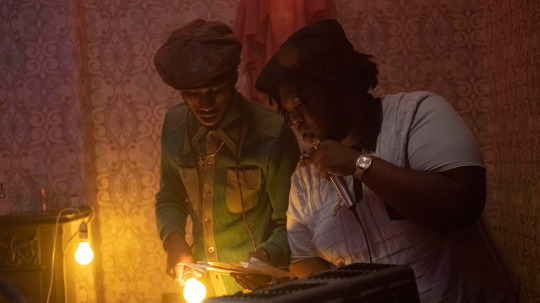
1. LOVERS ROCK, Steve McQueen
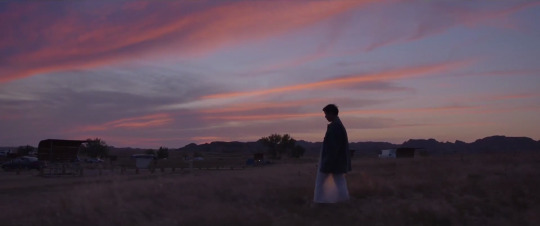
2. NOMADLAND, Chloe Zhao

3. ANOTHER ROUND, Thomas Vinterberg
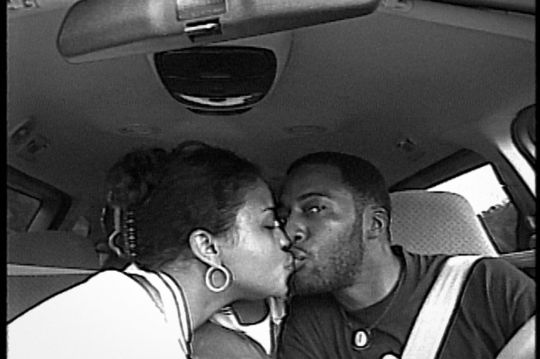
4. TIME, Garrett Bradley
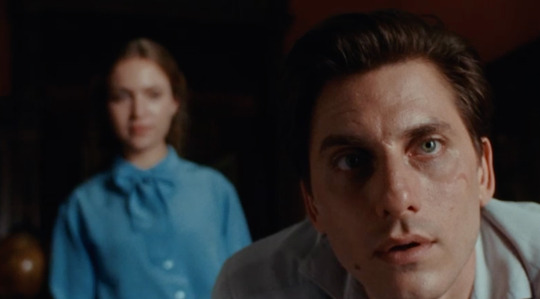
5. MARTIN EDEN, Pietro Marcello
--------------------
The rest of the Top 25, in alphabetical order. I loved these.
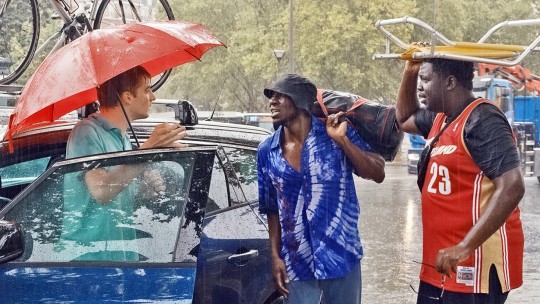
À L’ABORDAGE, Guillaume Brac
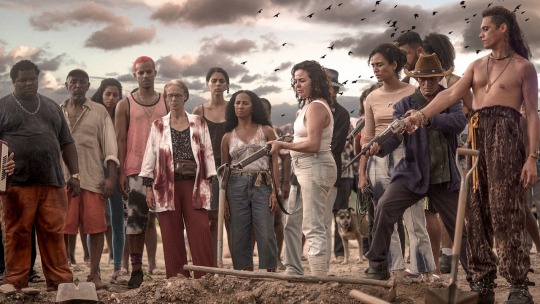
BACURAU, Kleber Mendonça Filho
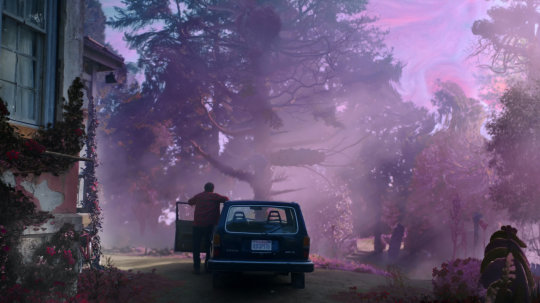
COLOR OUT OF SPACE, Richard Stanley
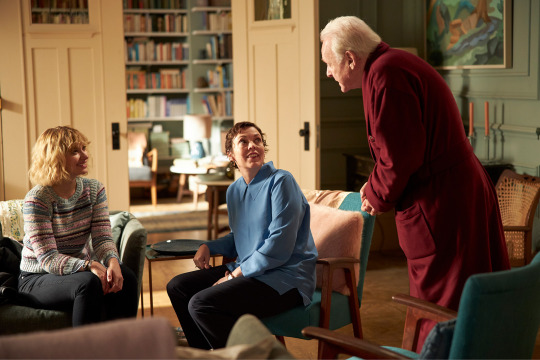
THE FATHER, Florian Zeller
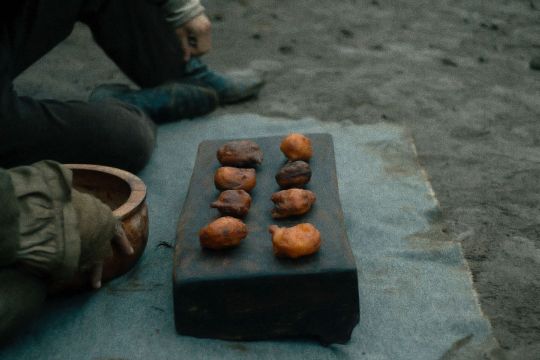
FIRST COW, Kelly Reichardt
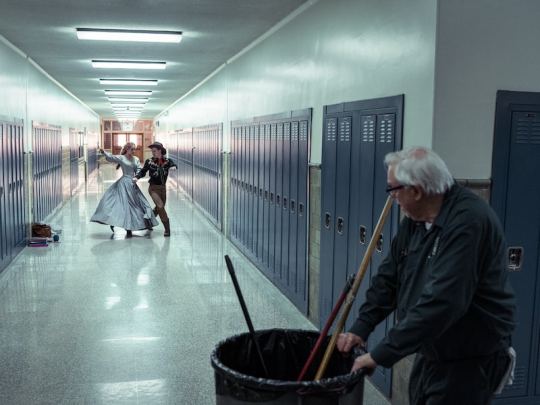
I’M THINKING OF ENDING THINGS, Charlie Kaufman
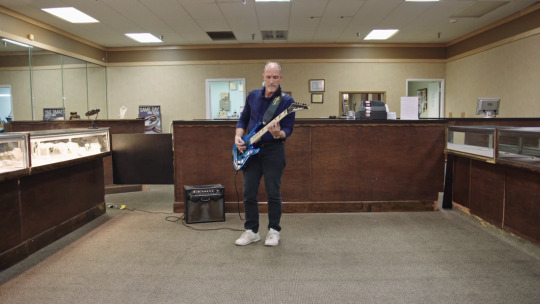
JASPER MALL, Bradford Thomason and Brett Whitcomb
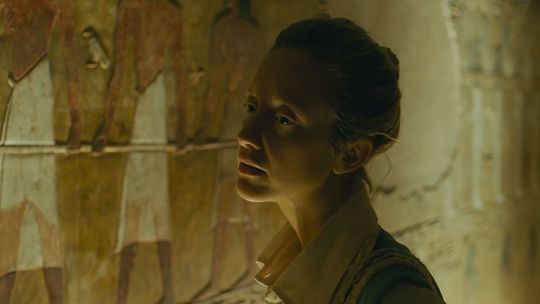
LUXOR, Zeina Durra
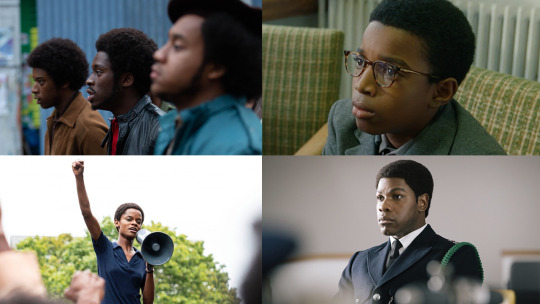
ALEX WHEATLE / EDUCATION / MANGROVE / RED, WHITE AND BLUE, Steve McQueen
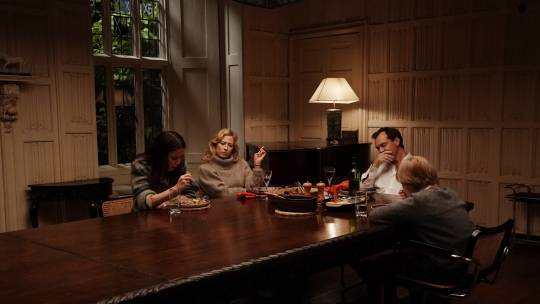
THE NEST, Sean Durkin

NEVER RARELY SOMETIMES ALWAYS, Eliza Hittman
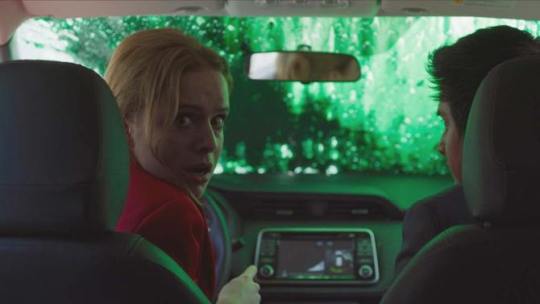
NEW ORDER, Michel Franco
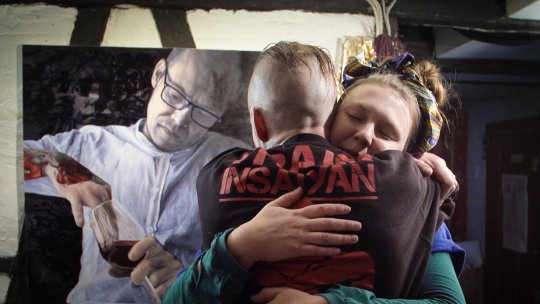
THE PAINTER & THE THIEF, Benjamin Ree
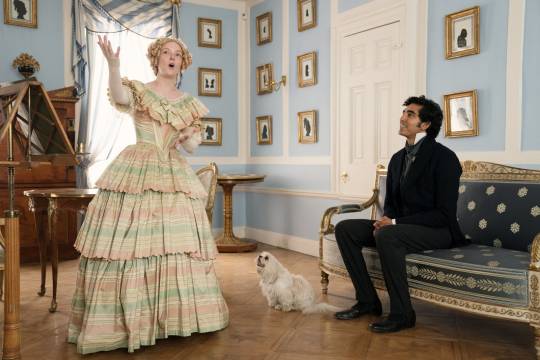
THE PERSONAL HISTORY OF DAVID COPPERFIELD, Armando Iannucci
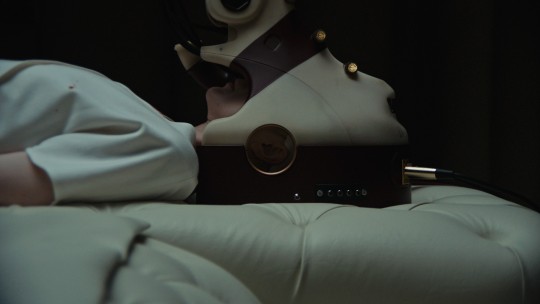
POSSESSOR, Brandon Cronenberg

PROMISING YOUNG WOMAN, Emerald Fennell
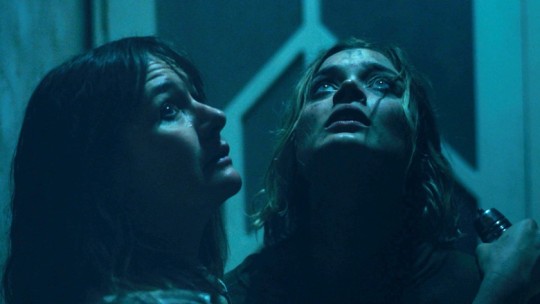
RELIC, Natalie Erika James

SAINT FRANCES, Alex Thompson

SOUND OF METAL, Darius Marder
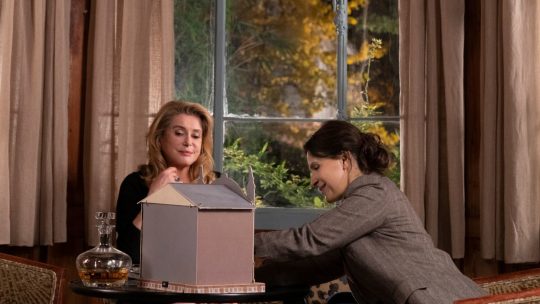
THE TRUTH, Hirokazu Koreeda
--------------------
I also enjoyed (some more than others):
Apples, The Assistant, Babyteeth, Bad Education, Black Bear, Blow the Man Down, Borat Subsequent Moviefilm, Butt Boy, The Climb, Da 5 Bloods, Deerskin, Emma, The Father (Bulgaria), Greed, His House, The Hunt, I Used to Go Here, I'm No Longer Here, Impetigore, The Intruder, The Invisible Man, Kajillionaire, La Llorona, Let Them All Talk, Lost Girls, The Man Who Sold His Skin, Mank, Never Gonna Snow Again, News of the World, One Night in Miami, Palm Springs, Preparations to Be Together for an Unknown Period of Time, Rebecca, She Dies Tomorrow, Shirley, Slow Machine, Sorry We Missed You, Soul, Spree, Straight Up, A Sun, Swallow, Tenet, Tesla, Tommaso, The Traitor, The Trip to Greece, True History of the Kelly Gang, Uncle Frank, Under the Open Sky, The Vast of Night, Vitalina Varela, Wendy, The Whistlers, Wildland, Young Ahmed
--------------------
And these documentaries!

American Murder: The Family Next Door, The American Sector, Assassins, Beastie Boys Story, The Bee Gees: How Can You Mend a Broken Heart, Bloody Nose Empty Pockets, Boys State, Brainiac: Transmissions After Zero, Circus of Books, Class Action Park, Collective, Crip Camp, David Byrne's American Utopia, Dick Johnson is Dead, Fireball: Visitors From Darker Worlds, The Go-Go's, Gunda, Miss Americana, MLK/FBI, The Mole Agent, Mucho Mucho Amor: The Legend of Walter Mercado, My Psychedelic Love Story, Mystify: Michael Hutchence, Narrowsburg, On the Record, Other Music, Sisters with Transistors, Spaceship Earth, The Way I See It, Whirlybird
--------------------
And these shorts:

Bye Bye Body (which I edited), Fit Model, Friday Night Pizza for Daddy, Hard Cracked the Wind, The Human Voice, John Was Trying to Contact Aliens, Michael's Preference West, What Did Jack Do?, World of Tomorrow Episode Three: The Absent Destinations of David Prime
--------------------
My favorite performance of the year:
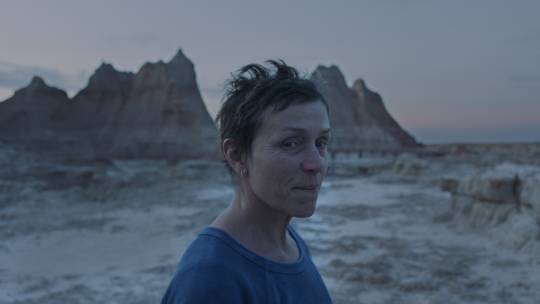
Frances McDormand as Fern in Nomadland
--------------------
Favorite ensembles:
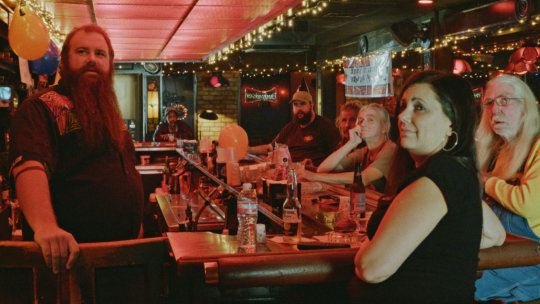
À l’abordage, Another Round, Bad Education, Babyteeth, Bloody Nose Empty Pockets, Blow the Man Down, Emma, First Cow, Kajillionaire, Let Them All Talk, Lovers Rock, Mangrove, Mank, One Night in Miami, The Personal History of David Copperfield, Promising Young Woman, True History of the Kelly Gang
--------------------
More memorable (and in some cases under-discussed) performances:
Christopher Abbott as Colin Tate in Possessor and as Gabe in Black Bear
Idir Ben Addi as Ahmed in Young Ahmed
Riz Ahmed as Ruben Stone in Sound of Metal
Daniel Algrant as Kelvin Kranz in Let Them All Talk
Maria Bakalova as Tutar Sagdiyev in Borat Subsequent Moviefilm
Haley Bennett as Hunter Conrad in Swallow
John Boyega as Leroy Logan in Red, White and Blue
Rob Brydon as Rob Brydon in The Trip to Greece
Jessie Buckley as Young Woman in I’m Thinking of Ending Things
Nicolas Cage as Nathan Gardner in Color Out of Space
Salif Cissé as Chérif in À L’abordage
Sheyi Cole as Alex Wheatle in Alex Wheatle
Cleopatra Coleman as Trina in The Argument
Carrie Coon as Allison O’Hara in The Nest
Michael Angelo Covino as Mike in The Climb
Willem Dafoe as Tommaso in Tommaso
Charles Dance as William Randolph Hearst in Mank
Catherine Deneuve as Fabienne Dangeville in The Truth
Katie Findlay as Rory in Straight Up
Sidney Flanigan as Autumn in Never Rarely Sometimes Always
Johnny Flynn as George Knightley in Emma
Julia Garner as Jane in The Assistant
Robbie Gee as Simeon in Alex Wheatle
Chris Giarmo as himself in David Byrne’s American Utopia
Betty Gilpin as Crystal Creasey in The Hunt
Ethan Hawke as Hank in The Truth
Kris Hitchen as Ricky Turner in Sorry We Missed You
Anthony Hopkins as Anthony in The Father
Jonathan Jules as Dennis Isaacs in Alex Wheatle
Sandra Guldberg Kampp as Ida in Wildland
Joe Keery as Kurt Knuckle in Spree
Udo Kier as Michael in Bacurau
Orion Lee as King Lu in First Cow
Delroy Lindo as Paul in Da 5 Bloods
Peter Macdissi as Walid "Wally" Nadeem in Uncle Frank
Matthew Macfadyen as Wilcock in The Assistant
George MacKay as Ned Kelly in True History of the Kelly Gang
Yahya Mahayni as Sam Ali in The Man Who Sold His Skin
Luca Marinelli as Martin Eden in Martin Eden
Tuppence Middleton as Sara Mankiewicz in Mank
Mads Mikkelsen as Martin in Another Round
Wunmi Mosaku as Rial in His House
Elisabeth Moss as Cecilia Kass in The Invisible Man
Kelly O'Sullivan as Bridget in Saint Frances
Shaun Parkes as Frank Crichlow in Mangrove
Robert Pattinson as Neil in Tenet
Paul Raci as Joe in Sound of Metal
Kadeem Ramsay as Samson in Lovers Rock
Gayle Rankin as Marissa in The Climb
Tanya Reynolds as Mrs Augusta Elton in Emma
Tyler Rice as Detective Russell Fox in Butt Boy
Andrea Riseborough as Hana in Luxor
Cecilia Roth as Marta in The Intruder
William Sadler as the Grim Reaper in Bill & Ted Face the Music
Kenyah Sandy as Kingsley Smith in Education
Amarah-Jae St. Aubyn as Martha Trenton in Lovers Rock
David Strathairn as David in Nomadland
Michael Stuhlbarg as Stanley Edgar Hyman in Shirley
Swankie as Swankie in Nomadland
Tilda Swinton as Woman in The Human Voice
Kristin Scott Thomas as Mrs. Danvers in Rebecca
Steve Toussaint as Ken Logan in Red, White and Blue
Alec Utgoff as Zhenia in Never Gonna Snow Again
Jairaj Varsani as young David Copperfield in The Personal History of David Copperfield
Ben Whishaw as Uriah Heep in The Personal History of David Copperfield
Sharlene Whyte as Agnes Smith in Education
Letitia Wright as Altheia Jones-LeCointe in Mangrove
Ramona Edith Williams as Frances in Saint Frances
Kôji Yakusho as Masao Mikami in Under the Open Sky
Youn Yuh-jung as Soon-ja in Minari
Helena Zengel as Johanna Leonberger in News of the World
--------------------
Favorite pre-2020 films I saw for the first time in 2020:
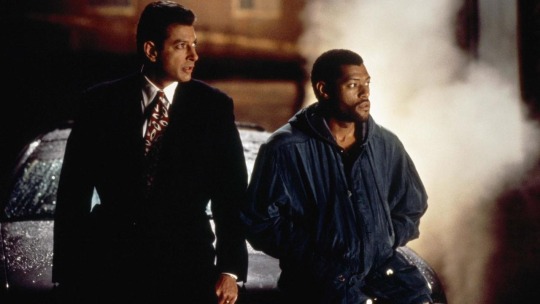
Blood on the Moon, But I’m A Cheerleader, Crooklyn, Cure, Daughters of the Dust, The Death of Dick Long, Deep Cover, The Draughtsman's Contract, Eyes of Laura Mars, Give Me Liberty, Greener Grass, Hardcore, High Hopes, The Last Party, Long Day's Journey into Night, Maiden, One Day Pina Asked, Persona, Right Now Wrong Then, Right On!, The Seventh Victim, Slightly French, Synonyms, Tammy and the T-Rex, Variety, The Watermelon Woman... and a tip of the hat to Coppola's new The Godfather Part III recut, The Godfather, Coda: The Death of Michael Corleone
39 notes
·
View notes
Text
Eve’s Coven
Here are the vampires I mentioned earlier, along with updated bios for some old ones. A lot of stuff is WIP so keep that in mind:
Allen Lecarde: A drifter vampire and hopeless romantic, he fell in love with Rika Amano and turned her without her consent, ruining their blossoming relationship. Miserable and remorseful, he wandered about the city until Eve’s coven took him in. His power is WIP.
Amon: The oldest and most powerful vampire and the leader of the coven. Eve calls him a close personal friend, and he has been alive for thousands of years. Unbeknownst to all, he is also the father of Nadia, Dracula’s adopted daughter. He is an extremely powerful wizard and has the incredible power to negate natural laws, cancelling out things such as gravity or momentum or density... or increasing/kickstarting them if he sees fit.
Bartholemew Comstock: A pilgrim from the 17th century, he wandered off from his colony and nearly died in the wilderness, finding salvation in Eve, who claimed to be an angel… she just left out the “fallen” part. Miserable upon learning he was a vampire and deeming himself an affront to God, he went into hiding for years,eventually coming to believe that there was little meaning to his actions if he was damned to Hell. He begin to strike down and feed off those he viewed as sinners, all the while bemoaning his miserable lot in life and fearing retribution from God.
Beatrix Cullen: A black widow type serial killer who loves to carve up her victims with a chainsaw. She is an incredibly skilled seamstress, and utilizes this in conjunction with her power, which allows her to give life to the lifeless, essentially allowing her to create golems without use of spells or scrolls. She has a very special project lined up utilizing her seven favorite husbands, but she’s looking for just the right head...
Cyrus Lovelace: A former slave owner, Confederacy member, and all-around unpleasant person who captured slaves and auctioned them off to vampires as cattle. He was the one who purchased Dahlia from her parents for her infractions and had rather untoward plans for her before Dracula broke up his operation. He has the power to hypnotize people with his voice.
Dallas Ryder: A white cowboy from the late 1800s, he was hunted relentlessly for the crime of loving a black man. He dedicated much of his time to roaming the South and slaughtering any Klansmen he found without mercy. He was eventually captured and nearly lynched, but he was rescued by Amon. He has the power to control the trajectory of any projectiles he releases as long as they remain within his eyesight, be it bullets from his gun or a paper airplane. The efficiency of the projectiles is also increased.
Dee Comporre, Giorgio Nero, & Mr. Viticcio: Three members of Cosa Nostra who once worked to enforce the will of an extremely powerful criminal in the 1920s. Giorgio is their leader, and has the power of magnetism, capable of feats similar to Magneto from X-Men; Dee is incredibly violent, paits her face up like a skull, and has the ability to secrete corrosive acid; Mr. Viticcio wears a coat, hat, sunglasses, and has a heavily bandaged face, and has the ability to stretch his limbs out like rubber. It is unknown if their names are real or aliases.
Elizabeth Bathory: The Blood Countess herself. After evading death in the 1600s thanks to Eve, she became a loyal follower of the demon, and was recruited into the Order of the 1800s. Dracula and Rasputin managed to defeat her and supposedly kill her, but Bathory is notoriously hard to slay. True to her infamous reputation, she tends to “Feed” by bathing in the blood of her victims.
Elvis Chavez: A big fan of Elvis growing up in the 60s and 70s, Elvis wished to someday be like the impersonators he saw at his father’s bar. He got his wish in the 80s when he went to Vegas, but was often ridiculed by his peers for portraying the chunkier Elvis of his later life due to his weight. He became a vampire mostly out of spite for those people, hoping to outlive the even as he indulged in gluttonous behavior. He is absolutely unashamed of his gut and kept his chubbiness even after he was turned. Power is WIP.
Flanagan & Tantomile: A pair of psychic vampire twins.
Jack Fairchild: Jack the Ripper himself. He has the power to travel through shadows. He is the most hated and feared member of the coven, and he has committed nearly every atrocity you can imagine, gleefully. He views himself as above laws and morality. He was once a student of Dracula, and the lover of Rose Milliner, but was swayed to join Eve and slaughter his peers at Dracula’s school. After Rose rejected him, he went on to become the cannibalistic, immoral spree killer he is known as today.
Kane Dødsstreik: A Nordic warlord. He has a quiet intensity and is in general given a fair amount of respect. He stands at 6′5″ tall. He has the power to use his voice as a weapon (a la Black Bolt); he tends to speak softly and infrequently, though this is less because of his power - which he has complete control over - and more because he finds most of his fellow coven mates unworthy of his words.
Kristoph Hollenfeuer: A former Nazi who commanded a secret paranormal investigation branch known as Enigma. He has the power to generate tracking bombs from his hands.
Michelle Kitt: Once a notorious cat burglar in the 50s alongside her husband, she would steal from the rich and give to the less fortunate (though she would still keep some for herself). After eventually settling down, enemies she’d made broke into her home, killed her husband and daughter, and left her face cut up and scarred heavily, as well as costing her an eye. She has the ability to ignore the rules of sacred hospitality, allowing her to enter buildings uninvited at the cost of her pronounced combat skills being weakened, as well as the power to move silently.
Mickey Harrelson: A former hitman and one of the new Order. His power is WIP.
Nestor Sokolov: A lost cosmonaut, whose supposed death was covered up by the Soviet Union after he burned on reentry. While he did suffer severe burns, he managed to survive, and was saved from death by Amon. He often still wears a modified space suit to hide his face. He has the power to phase through solid objects.
Pierre Labeau: A man hailing from Louisiana, he was born with a disfigured nose that made his upper class mother feel ashamed. She locked him in the attic, his only friends and interests being the various spiders therein; eventually, his mother even cut his nose off, something he would return to her in kind before killing her. He began to kill people like her, snobbish upper class twits, cutting off their noses and slitting their throats. He learned of the phrase “cut off her nose to spite her face” and decided to dub himself Spider Face after the mondegreen one could discern from the phrase. He was eventually caught in the act and driven into the bayou where he supposedly died, though Amon in truth allowed him to join Eve’s coven. His love of arachnids caused him to gain their powers, making him much like Spider-Man, as well as giving him incredibly virulent venom. While he certainly isn’t totally wicked, he also revels in being something of an area boogeyman and proudly proclaims himself a villain any chance he gets.
Piper Sanchez – One of the new Order. Formerly a young, mute homeless man. Loves rock music and has a guitar. Has the power to control and empower rats, which he can do with his music.
Rhapsody Von Braun: Hailing from the early 60s, Rhapsody was an artist who had her career derailed by workplace sexism, which led to a car accident that permanently damaged her leg and led to her becoming a drug addict. She spends a lot of her time sleeping, and walks with a cane even as a vampire. She’s rather sweet and pleasant, though she is a bit scatterbrained. Her power is to make drawings she draws come to life.
Ryo Amano: The elder son of the Amano family and a criminal mastermind, for years he served alongside Jemima Mathers, regulating crime in the city and ensuring his work would go unhindered. However, his cruel past caught up to him: when it was revealed he had his sister violently beaten and kicked out of the family, and that he had driven his own mother to suicide by making her blame herself for her daughter’s disappearance, he had to go into hiding. Eve soon discovered him, and his lineage was revealed to him - his father was Amadeus Zephyri, which made him a dhampyr. Granted vampirism, he soon found himself in possession of a powerful new skill. Where his father could stop time, he could essentially utilize a localized acceleration of time, causing negative effects to rapidly occur, such as allowing a decrepit pillar to crumble or to cause a knife wound to fester and kill the victim immediately.
Sawney Bean: The infamous Scottish cannibal of legend, transformed into a vampire by Eve as he was about to die in his sealed-in cavern alongside the remains of his family. He eventually decided to give in to the ultimate vampire taboo and consume another vampire; finding he liked the taste, he continued to eat other vampires who crossed him, eventually twisting and transforming into a terrifying monster with metal teeth and claws that stood well over seven feet tall. He rarely ventures out from his hideaway unless called by his masters.
Walter Sherman: A good, kindhearted man who ever since the 1910s always looked to the future and was excited for progress. After his wife and two children died in a freak accident, he attempted suicide, but was turned into a vampire instead. Power Is WIP.
Wayne Nicol: A former circus clown. He has the ability to enter people’s minds and utilize their most powerful fears against them.
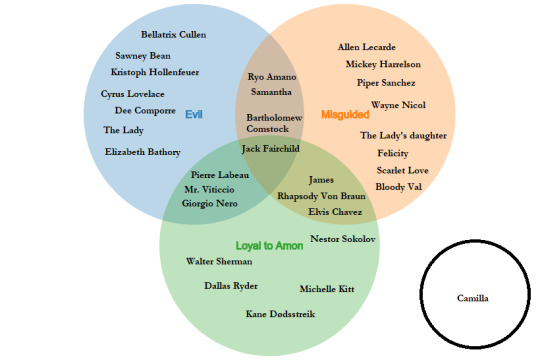
8 notes
·
View notes
Text

Richard Cromwell (born LeRoy Melvin Radabaugh, also known as Roy Radabaugh; January 8, 1910 – October 11, 1960) was an American actor. His career was at its pinnacle with his work in Jezebel (1938) with Bette Davis and Henry Fonda and again with Fonda in John Ford's Young Mr. Lincoln (1939). Cromwell's fame was perhaps first assured in The Lives of a Bengal Lancer (1935), sharing top billing with Gary Cooper and Franchot Tone.
That film was the first major effort directed by Henry Hathaway and it was based upon the popular novel by Francis Yeats-Brown. The Lives of a Bengal Lancer earned Paramount Studios a nomination for Best Picture in 1935, though Mutiny on the Bounty instead took the top award at the Academy Awards that year.
Leslie Halliwell in The Filmgoer's Companion, summed up Cromwell's enduring appeal when he described him as "a leading man, [the] gentle hero of early sound films."
Cromwell was born LeRoy Melvin Radabaugh in Long Beach, California, the second of five children, to his mother Fay B. (Stocking) and his father, Ralph R. Radabaugh, who was an inventor. Among Ralph's patented creations was the amusement-park swing ride called the "Monoflyer", a variation of which is still in use at many carnivals today. In 1918, when young "Roy" was still in grade school, his father died suddenly, one of the millions of people who perished during the "Spanish flu" pandemic.
Later, while enrolled as a teenager in the Chouinard Art Institute in Los Angeles on a scholarship, young Roy helped to support his family with odd jobs. The school was the precursor of the California Institute of the Arts, and it was there where he met fellow classmate Edith Posener. Posener, later known as Edith Head, would become one of the leading costume designers in American film history.
Cromwell ran a shop in Hollywood where he sold pictures, made lampshades, and designed colour schemes for houses. As Cromwell developed his talents for lifelike mask-making and oil painting, he formed friendships in the late 1920s with various film starlets who posed for him and collected his works, including Tallulah Bankhead, Joan Crawford, Greta Garbo, Claire Dubrey and Ann Sothern. Actress and future Academy Award-winner Marie Dressler was also a friend; the two would later share top-billing in the early talkie film Emma.
Still known as "Roy Radabaugh", he had just two days in film extra work on the side, and can be seen in King of Jazz (1930), along with the film's star, Paul Whiteman and his orchestra. On a whim, friends encouraged Roy to audition in 1930 for the remake of the Richard Barthelmess silent: Tol'able David (1930). Radabaugh won the role over thousands of hopefuls, and in storybook fashion, Harry Cohn gave him his screen name and launched his career. Cromwell earned $75 per week for his work on Tol'able David. Noah Beery Sr. and John Carradine co-starred in the film. Later, Cohn signed Cromwell to a multi-year contract based on the strength of his performance and success in his first venture at the box-office. Amidst the flurry of publicity during this period, Cromwell toured the country, even meeting President Herbert Hoover in Washington, D.C.
Cromwell by then had maintained a deep friendship with Marie Dressler, which continued until her death from cancer in 1934. Dressler was nominated for a second Best Actress award for her 1932 portrayal of the title role in Emma.
With that film, Dressler demonstrated her profound generosity to other performers: Dressler personally insisted that her studio bosses cast Cromwell on a loan-out in the lead opposite her — it was another break that helped sustain his rising status in Hollywood. Emma also starred Myrna Loy in one of her earlier screen performances. After production on Emma was completed, Director Clarence Brown tested Cromwell for the male lead in his next feature: The Son-Daughter, which was set to star Helen Hayes. However, the part of the oriental prince ultimately went to Ramón Novarro, and Cromwell never again worked at MGM.
Cromwell's next role in 1932 was on loan to RKO and was as Mike in Gregory La Cava's, The Age of Consent, co-starring Eric Linden and Dorothy Wilson. Cromwell is also remembered during this period in Hoop-La (1933), where he is seduced by Clara Bow. This film is considered the swan song of Bow's career. Next, the much in demand Cromwell starred in Tom Brown of Culver that year, as well.
Around this period in his career in the early to mid-30s, Cromwell also did some print ads and promotional work for Lucky Strike brand cigarettes. According to his niece, Joan Radabaugh, Cromwell was a very heavy smoker. Nevertheless, at his home he was always the gracious host, as his niece related, and as such he took great care to empty the ashtrays regularly, almost to the point of obsession.
Next up, was an early standout performance by Cromwell in the role as the leader of the youth gang in Cecil B. DeMille's now cult-favorite, This Day and Age (1933). To ensure that Cromwell's character used current slang, DeMille asked high school student Horace Hahn to read the script and comment (at the time, Hahn was senior class president at Los Angeles High School). While again on loan from Columbia, Cromwell's by then salary of $200 per week was paid by Paramount Pictures, DeMille's studio. Diana Serra Cary, in her biography of Jackie Coogan, relates an episode on the set wherein Cromwell came to the aid of actress Judith Allen:
I watched as he (DeMille) systematically reduced ingenue ... Allen to screaming hysterics by calling her every insulting name in the book in front of company and crew simply to bring on tears ... Cromwell was the only man on the set who dared confront the tyrannical DeMille. White with rage, Cromwell stopped the scene and threatened to deck him if he didn't let up on the devastated girl. He (Cromwell) then drove her home himself. After that courageous act the chivalric Cromwell was unanimously praised as a veritable dragon slayer by everyone who had witnessed that scene.
After a promising start, Cromwell's many early pictures at Columbia Pictures and elsewhere were mostly inconsequential and are largely forgotten today. Cromwell starred with Will Rogers in Life Begins at 40 for Fox Film Corporation in 1935, it was one of Rogers' last roles and Poppy for Paramount in 1936 wherein Cromwell played the suitor of W.C. Fields' daughter, Rochelle Hudson. In 1937, he was the young bank-robber in love with Helen Mack and on the lam from Lionel Atwill in The Wrong Road for RKO.
In 1936, Cromwell took a detour in his career to Broadway for the chance to star as an evil cadet in an original play by Joseph Viertel, So Proudly We Hail!. The military drama was directed by future film director Charles Walters, co-starred Edward Andrews and Eddie Bracken, and opened to much fanfare. The reviews of the play at the time called Cromwell's acting "a striking portrayal" (New York Herald Tribune) and his performance an "astonishing characterization" (New York World Telegram). The New York Times said that in the play, Cromwell "ran the gamut of emotions". However, the play closed after only 14 performances at the 46th Street Theater.
By now, Cromwell had shed his restrictive Columbia contract, with its handsome $500 per week salary, and pursued acting work as a freelancer in other media as well. On July 15, 1937, Cromwell guest-starred on The Royal Gelatin Hour hosted by Rudy Vallee, in a dramatic skit opposite Fay Wray. Enjoying the experience, Cromwell had his agent secure for him an audition for the role of Kit Marshall, on the soap opera Those We Love, first on NBC Radio and then CBS Radio. As a regular on the Monday night program which ran from 1938 until 1942, Cromwell played opposite Nan Grey who played Kit's twin sister Kathy. Cromwell as Kit was later replaced by Bill Henry. Rounding out the cast were Robert Cummings and Gale Gordon.
In the late 1930s, Cromwell appeared in Storm Over Bengal, for Republic Pictures, in order to capitalize on the success of The Lives of a Bengal Lancer. Aside from the aforementioned standout roles in Jezebel and The Lives of a Bengal Lancer, Cromwell did another notable turn as defendant Matt Clay to Henry Fonda's title-performance in Young Mr. Lincoln (1939).
During this period, Cromwell was continuing to enjoy the various invitations coming his way as a member of the A-list Hollywood social circuit. According to Bob Thomas, in his biography of Joan Crawford, Cromwell was a regular at the Saturday Night dinner parties of his former co-star Franchot Tone and then-wife Crawford. Other guests whom Cromwell dined with there included Barbara Stanwyck and then-husband Frank Fay, and William Haines and his partner Jimmie Shields. During the freewheeling heyday of West L.A. nightlife in the late 30s, Cromwell is said by author Charles Higham to have carried on a sometime, though obviously very discreet, affair with aviator and businessman Howard Hughes.
In 1939, Cromwell again tried his luck on the stage in a regional production of Sutton Vane's play Outward Bound featuring Dorothy Jordan as his co-star. The cast of the production at the Los Angeles Biltmore Theater also included Cora Witherspoon and Reginald Denny
Cromwell served during the last two years of World War II with the United States Coast Guard, along with fellow actor and enlistee Cesar Romero. Actor Gig Young was also a member of this branch of the service during the war. During this period, Cole Porter rented Cromwell's home in the Hollywood Hills, where Porter worked at length on Panama Hattie. Director James Whale was a personal friend, for whom Cromwell had starred in The Road Back (1937), the ill-fated sequel to All Quiet on the Western Front. With the war's end, and upon returning to California from the Pacific after nearly three years of service with the Coast Guard, Cromwell acted in local theater productions. He also signed on for live performances in summer stock in the East during this period.
When in town, Cromwell was a fixture within the Hollywood social scene. According to the book Cut! Hollywood Murders, Accidents and Other Tragedies, Cromwell was a regular at George Cukor's "boys nights".
Back in California for good, Cromwell was married once, briefly (1945–1946), to actress Angela Lansbury, when she was 19 and Cromwell was 35. Cromwell and Lansbury eloped and were married in a small civil ceremony on September 27, 1945, in Independence, California. In her authorized biography, Balancing Act, Lansbury recounts her life with Cromwell, as well as the couple's close friendship with Zachary Scott and his first wife, Elaine. Lansbury and Cromwell have stars within walking distance of each other on the Hollywood Walk of Fame.
Cromwell made just one statement to the press regarding his wife of nine months and one of her habits: "All over the house, tea bags. In the middle of the night she'd get up and start drinking tea. It nearly drove me crazy."
According to the biography: Angela Lansbury, A Life on Stage and Screen, Lansbury stated in a 1966 interview that her first marriage, "was a mistake" and that she learned from it. She stated, "I wouldn't have not done it", and, "I was too young at 19. [The marriage] shouldn't have happened." Articles based on interviews with Lansbury have stated that Cromwell was gay. Cromwell and Lansbury remained friends until his death in 1960.
Before World War II, in the early 1940s, Universal Pictures released Enemy Agent starring Cromwell as a draftsman who thwarts the Nazis. In 1942 he then went on to appear in marginal but still watchable fare such as Baby Face Morgan, which co-starred Mary Carlisle and was produced by Producers Releasing Corporation, one of the "Poverty Row" studios.
Cromwell enjoyed a career boost, if not a critically acclaimed performance, in the film adaptation of the hit radio serial: Cosmo Jones, Crime Smasher (1943), opposite Gale Storm. Next up at Monogram Pictures he was cast as a doctor working covertly for the police department to catch the mobsters in the very forgettable, though endearing Riot Squad, wherein his "fiancée", Rita Quigley, breaks their engagement. Cromwell's break from films due to his stint in the Service meant that he was not much in demand after the War's end, and he retired from films after his comeback fizzled. His last role was in a noir flick of 1948, Bungalow 13. All told, Cromwell's film career spanned 39 films.
In the 1950s, Cromwell went back to artistic roots and studied ceramics. He built a pottery studio at his home. The home still stands today and is located in the hills above Sunset Boulevard on North Miller Drive. There, he successfully designed coveted decorative tiles for himself and for his industry friends, which, according to his niece, Joan Radabaugh, he marketed under his stage name.
Around this time, Baby Peggy Montgomery (a.k.a. Diana Serra Cary), who had appeared in This Day and Age with Cromwell many years earlier, recalled visiting Cromwell at his home along with her late husband during this period to see his "beautiful ceramic screen which had won him a prize at the L.A. County Fair." His original tiles as well as his large decorative art deco-style wall paintings of Adam and Eve can still be seen today in the mezzanine off the balcony of the restored Pantages Theatre in Hollywood, which is today considered a noted architectural landmark.
Under the name Radabaugh, Cromwell wrote extensively, producing several published stories and an unfinished novel in the 1950s. After years of heavy drinking with a social circle of friends that included the likes of Christopher Isherwood, Cromwell ultimately changed his ways and became an early participant and supporter of Alcoholics Anonymous in the Los Angeles Area.
In July 1960, Cromwell signed with producer Maury Dexter for 20th Century Fox's planned production of The Little Shepherd of Kingdom Come, co-starring Jimmie Rodgers, Bob Dix (son of Richard Dix), and Neil Hamilton who replaced Cromwell in the film. Cromwell became ill and died on October 11, 1960 in Hollywood of liver cancer, at the age of 50. He is interred at Fairhaven Memorial Park in Santa Ana, California.
Cromwell's legacy is preserved today by his nephew Dan Putnam, and his cousin Bill Keane IV, both of the Conejo Valley in Southern California, as well as the family of his late niece, Joan Radabaugh, of the Central Coast. In 2005, Keane donated materials relating to Cromwell's radio performances to the Thousand Oaks Library's Special Collection, "The American Radio Archive". In 2007, Keane donated memorabilia relating to Cromwell's film career and ceramics work to the AMPAS Margaret Herrick Library in Beverly Hills.
Cromwell was mentioned in Gore Vidal's satirical novel Myra Breckinridge (1968) as "the late Richard Cromwell, so satisfyingly tortured in Lives of a Bengal Lancer".
#Richard Cromwell#classic hollywood#classic movie stars#golden age of hollywood#old hollywood#1930s hollywood#1940s hollywood
4 notes
·
View notes
Text
Blundstones and Neo-Nazis
February 4, 2021
Romper Stomper (1992). Directed by: Geoffrey Wright. Produced By: Film Victoria. Starring: Russell Crowe (Hando), Daniel Pollock (Davey), Jacqueline McKenzie (Gabe), Alex Scott (Martin).
Romper Stomper is a film that depicts the lives of a group of Neo-Nazis as their cohesiveness disintegrates in the face of a changing society. The film juxtaposes two reactions to this disintegration in the characters of Hando and Davey. Whereas Hando becomes unhinged and lashes out increasingly shunning the needs of his group as well as the reality of his situation, Davey questions the practicality of following Hando down his spiral. Such a contrast is made more apparent by the love interest of the film, Gabe, whose relationship with Hando suffers as Hando loses his control over his life, while her relationship with Davey grows to have feelings of love in a group where genuine care is scarce.
The film intends to depict the uncompromising nature of white nationalism. At the very beginning of the film, Hando is surrounded by a group of friends who party together and all share in the revelry of their perceived racial superiority. Yet, as he is asked to yield ground on his beliefs, whether that be to allow the Vietnamese-Australians to buy his favorite bar, or when the hanger-on women of his group disapprove of murder, He doubles-down on his erroneous belief that following the dogma of white nationalism is the right course of action.
The film succeeds in bringing its point across not through the character of Hando, but through the choices that Davey makes when presented with the same situation. For example, to Hando, Gabe is another sexual conquest to had his way with while he praises Adolf Hitler and the 4th Reich, yet to Davey, she represents someone that took the time out of her life to care for him when he became wounded. She shows him a side of the world to which he is not accustomed, and demonstrates that Davey is not as indoctrinated into racial theory as Hando. He wants the companionship that Hando has shown him in this group, but is less ardent in displaying active hatred. Tellingly, it is only after Gabe kicks the Vietnamese owner of the pub that Davey finds it alright to show off in front of her and beat the man bloody. This conflict of values between the love and care he seeks and the racist world to which he belongs come to a head in the final scene on the beach. There, as Hando is suffocating Gabe with all his animalistic hatred, Davey choses to put an end to his friend’s life, and thereby putting an end to his last link to his former life. Davey’s choice not to subdue Hando, but to straight out kill him, show the only response that white nationalism offers to all its adherents, either you stand with the neo-Nazis, or you oppose them; both options lead to the eradication of the other.
The most obvious comparison for Romper Stomper is American History X (1998). This Tony Kaye film depicts the life of a white nationalist in America as he tries to rehabilitate his life. Both films show the unforgiving nature of becoming involved in the male dominated, racist world of white nationalism. The depict men having huge booze filled parties, and networks of friendships that consider each other as close as kin due to their racial parity. The endings to both films hint at the same message, though American History X offers a take that is far more tragic than its Australian cousin. For while there is a redemptive component at play in the character of Davey, in American History X, no matter what strides Derek Vinyard makes in his own relationship with other races, his family still suffers for his chosen past.
Punk rock is a genre defined by short bursts of anti-authoritative energy. To this end, the backing tracks to the fight scenes in Romper Stomper are extremely effective in energizing its audience. While the actions on screen are hateful depictions of racially motivated crimes, the backing tracks bolster the positions of both sides of the conflict. If you are watching this movie with the intent of idolizing Hando, then the lyrics of the “Fourth Reich Fighting Man” will confirm not only the glory of the cause that you are fighting for, but also that there is already an established group of people making action music for your movement. Likewise, if you see yourself represented in the plight of the Vietnamese-Australians climbing up the tire structure to defend their newly acquired bar, then the lyrics of songs that are filled with hatred towards all types of minorities will make your own blood boil and beg for these men to be destroyed. The soundtrack to Romper Stomper underlies the message of the film that hate breeds hate.
On a personal note, one of the things that struck me the most is how much the neo-Nazis of Australia love Blundstones. This made sense to me the more I thought about it. Blundstones are an Australian product, and they love all things made to represent white Australia so of course this would be no different. The only thing is that I have spent a lot of years among liberal arts students of all races, religions and creeds, and we LOVE a good Blunstone too. So to see such an iconic piece of Halifax liberalism crushing the hand of a Vietnamese man who is trying to escape a gang of neo-Nazis, well, that woke me up.
Review: https://www.theguardian.com/film/australia-culture-blog/2014/jan/10/romper-stomper-classic-australian-film
In this review, Luke Buckmaster ponders at the nature of the film’s ending, questioning if “Wright being ironic? Sarcastic? Dabbling in some kind of horrible last-minute black comedy? Hando's takedown feels mean-spirited at best and sadistic at worst.” While I feel like in a traditional movie, this is worth considering, Hando is hardly a usual protagonist. Even an anti-hero like Walter White has some modicum of sympathy that the audience can cling to in order to make the case that they are cheering for him. In Romper Stomper there is no attempt to sway the pathos of the audience. Hando does not try to redeem himself, or overcome his personal shortcomings. To Mr. Buckmaster I reply, that there is no irony in Hando’s death. It is the rightful cathartic end to a life that bred racial hatred and was wholly unapologetic about it. This is also to the benefit of Wright’s defense in filming a movie filled with hateful scenes of racial violence. At no point does he try to make Hando a sympathetic character, precisely because there is no redeemable quality in the way that Hando relates to his ideological stance.
Overall I give this film a 7/10. This falls within the realm of movies that come to have surprised me in some way. Romper Stomper is an action movie filled tale that verges on being moralizing without holding its audience’s hand. The main Faultline it falls on is that its message might be too subtle for its own good. In the quick google search I found at minimum two racially motivated killings or slaughters whose perpetrators drew inspiration from this very movie. Regardless of the artistic intent behind the film, such a real life consequence within the content that Wright presents has to come with a dire warning that it did not do enough to dissuade its audience that Hando is no hero. Even in his own review, Luke Buckmaster, whom I have to assume is no neo-Nazi glorifier finds the death of Hando possibly ‘mean-spirited’. A narrative that lacks blatant condemnation of white-nationalist ideologies while degrading its protagonist leaves Hando as an idol, martyr and symbol for all those who believe in that hatred.
4 notes
·
View notes
Text
Friday, October 30, 2020
U.S. refugee admissions
(Foreign Policy) The number of refugees allowed into the United States in the coming year will be at its lowest level in modern times, after the White House announced just 15,000 refugees would be allowed settle in the country next year. According to a White House memo, 5,000 of those places will go to refugees facing religious persecution, 4,000 are reserved for refugees from Iraq who helped the United States, and 1,000 for refugees from El Salvador, Guatemala, and Honduras; 5,000 open slots remain, although refugees from Somalia, Syria, and Yemen are banned unless they can meet special humanitarian criteria. The future of U.S. refugee policy hangs on Tuesday’s vote: Former Vice President Joe Biden has promised to increase annual refugee admissions to 125,000, while the Guardian reports that a second Trump administration would seek to slash such admissions to zero.
Days From Election, Police Killing of Black Man Roils Philadelphia
(NYT) There is a grim familiarity to it all. In the final days of a bitter election, it is a reprise of the terrible images that the country has come to know all too well this year: The shaky cellphone video, the abrupt death of a Black man at the hands of the police. The howls of grief at the scene. The protests that formed immediately. The looting of stores that lasted late into the night. It began on Monday, when two officers confronted Walter Wallace Jr., a 27-year-old with a history of mental health problems. A lawyer for the family said that he was experiencing a crisis that day and that the family told officers about it when they arrived at the scene. In an encounter captured in video that appeared on social media, Mr. Wallace is seen walking into the street in the direction of the officers, who back away and aim their guns at him. Someone yells repeatedly at Mr. Wallace to “put the knife down.” The officers then fire multiple rounds. After Mr. Wallace falls to the ground, his mother screams and rushes to his body. Mr. Wallace later died of his wounds at a nearby hospital, and the neighborhood exploded in rage. In the days since, dozens have been arrested, cars have been burned and 53 officers have been hurt. On Tuesday, Gov. Tom Wolf called in the National Guard. On Wednesday, the city declared a 9 p.m. curfew. And once again, the people in the neighborhood where it all took place were left to consider what had happened and what, if anything, could be done about it.
Zeta soaks Southeast after swamping Gulf Coast; 6 dead
(AP) Millions of people were without power and at least six were dead Thursday after Hurricane Zeta slammed into Louisiana and made a beeline across the South, leaving shattered buildings, thousands of downed trees and fresh anguish over a record-setting hurricane season. From the bayous of the Gulf Coast to Atlanta and beyond, Southerners used to dealing with dangerous weather were left to pick up the pieces once again. In Atlanta and New Orleans, drivers dodged trees in roads and navigated intersections without traffic signals. As many as 2.6 million homes and businesses lost power across seven states, but the lights were coming back on slowly. The sun came out and temperatures cooled, but trees were still swaying as the storm’s remnants blew through. Louisiana Gov. John Bel Edwards said the state sustained “catastrophic” damage on Grand Isle in Jefferson Parish, where Zeta punched three breaches in the levee. Edwards ordered the Louisiana National Guard to fly in soldiers to assist with search and rescue efforts and urged continued caution.
Violent criminal groups are eroding Mexico’s authority and claiming more territory
(Washington Post) Organized crime here once meant a handful of cartels shipping narcotics up the highways to the United States. In a fundamental shift, the criminals of today are reaching ever deeper into the country, infiltrating communities, police forces and town halls. A dizzying range of armed groups—perhaps more than 200—have diversified into a broadening array of activities. They’re not only moving drugs but kidnapping Mexicans, trafficking migrants and shaking down businesses from lime growers to mining companies. It can be easy to miss how much the nation’s criminal threat has evolved. Mexico is the United States’ No. 1 trading partner, a country of humming factories and tranquil beach resorts. But despite 14 years of military operations—and $3 billion in U.S. anti-narcotics aid—criminal organizations are transforming the Mexican landscape: In a classified study produced in 2018 but not previously reported, CIA analysts concluded that drug-trafficking groups had gained effective control over about 20 percent of Mexico, according to several current and former U.S. officials. / Homicides in the last two years have surged to their highest levels in six decades; 2020 is on track to set another record. Mexico’s murder rate is more than four times that of the United States. / Hundreds of thousands of people have fled their homes to escape violence; the Mexican Congress is poised to pass the country’s first law to help the internally displaced. / More than 77,000 people have disappeared, authorities reported this year, a far larger total than previous governments acknowledged. It is the greatest such crisis in Latin America since the “dirty wars” of the 1970s and 1980s. / The State Department is urging Americans to avoid travel to half of Mexico’s states, tagging five of them as Level 4 for danger—the same as Syria, Afghanistan and Iraq. President Andrés Manuel López Obrador has created a 100,000-member national guard to reclaim areas with little state presence. It’s not clear that will make a significant difference. Years of Mexican and U.S. strategy—arresting drug kingpins, training Mexican police, overhauling the justice system—have failed to curb the violence.
Many Cubans hope US election will lead to renewed ties
(AP) Not so long ago the tables at Woow!!! restaurant in Havana were filled with tourists ordering mojitos and plates of grilled octopus. But as President Donald Trump rolled back Obama-era measures opening Cuba relations, the restaurant grew increasingly empty. Now entrepreneurs like Orlando Alain Rodríguez are keeping a close eye on the upcoming U.S. presidential election in hope that a win by Democratic challenger Joe Biden might lead to a renewal of a relationship cut short. “The Trump era has been like a virus to tourism in Cuba,” said Rodríguez, the owner of Woow!!! and another restaurant feeling the pinch. Few countries in Latin America have seen as dramatic a change in U.S. relations during the Trump administration or have as much at stake in who wins the election. Former President Barack Obama restored diplomatic relations, loosened restrictions on travel and remittances and became the first U.S. chief of state to set foot in the island in 88 years. The result was a boom in tourism and business growth on the island. Trump has steadily reversed that opening, tapping into the frustrations of a wide segment of the Cuban American community that does not support opening relations while a communist government remains in power. He put into effect part of a previously suspended U.S. law that permits American citizens to sue companies that have benefited from private properties confiscated by the Cuban government, put a new cap on remittances, reduced commercial flights and banned cruises. The president has also forbidden Americans from buying cigars, rum or staying in government-run hotels. A Trump reelection would likely spell another four years of tightened U.S. sanctions while many expect a Biden administration to carry out at least some opening.
Winter gloom settles over Europe
(Washington Post) The clocks were dialed back an hour across Europe this week, and the long nights come early now. The hospitals are filling up, as the cafes are shutting down. Governments are threatening to cancel Christmas gatherings. As new coronavirus infections surge again in Europe, breaking daily records, the mood is growing dark on the continent—and it’s not even November. The reprieve of summer feels a long time ago, and Europe is entering a serious funk. Germany and France announced national lockdowns Wednesday to try to get the virus under control. The new measures are less restrictive than in the spring, and yet they face more resistance. People are no longer so willing to remain confined to their homes, venturing onto balconies in the evenings to applaud health-care workers. Many people remain scared of covid-19, but they are exhausted and frustrated—and growing angry and rebellious. In a sign of the times, the head of the World Health Organization recognized the “pandemic fatigue that people are feeling” but urged “we must not give up.” The smugness in Europe about having bested the Americans under President Trump is fading with the daily record-breaking counts.
Young and Jobless in Europe: ‘It’s Been Desperate’
(NYT) Like millions of young people across Europe, Rebecca Lee, 25, has suddenly found herself shut out of the labor market as the economic toll of the pandemic intensifies. Her job as a personal assistant at a London architecture firm, where she had worked for two years, was eliminated in September, leaving her looking for work of any kind. Ms. Lee, who has a degree in illustration from the University of Westminster, sent out nearly 100 job applications. After scores of rejections, and even being wait-listed for a food delivery gig at Deliveroo, she finally landed a two-month contract at a family-aid charity that pays 10 pounds (about $13) an hour. “At the moment I will take anything I can get,” Ms. Lee said. “It’s been desperate.” The coronavirus pandemic is rapidly fueling a new youth unemployment crisis in Europe. Young people are being disproportionately hit, economically and socially, by lockdown restrictions, forcing many to make painful adjustments and leaving policymakers grasping for solutions. Years of job growth has eroded in a matter of months, leaving more than twice as many young people than other adults out of work. The jobless rate for people 25 and under jumped from 14.7 percent in January to 17.6 percent in August. Europe is not the only place where younger workers face a jobs crunch. Young Americans are especially vulnerable to the downturn. In China, young adults are struggling for jobs in the post-outbreak era. But in Europe, the pandemic’s economic impact puts an entire generation at risk, according to the Organization for Economic Cooperation and Development.
3 dead in church attack, plunging France into dual emergency
(AP) A man armed with a knife attacked people inside a French church and killed three Thursday, prompting the government to raise its security alert status to the maximum level hours before a nationwide coronavirus lockdown. The attack in Mediterranean city of Nice was the third in two months in France that authorities have attributed to Muslim extremists, including the beheading of a teacher. It comes during a growing furor over caricatures of the Prophet Muhammad that were republished in recent months by the satirical newspaper Charlie Hebdo—renewing vociferous debate in France and the Muslim world over the depictions that Muslims consider offensive but are protected by French free speech laws. Other confrontations and attacks were reported Thursday in the southern French city of Avignon and in the Saudi city of Jiddah, but it was not immediately clear if they were linked to the attack in Nice.
Germany does not believe Thai king has breached state business ban: source
(Reuters) Germany does not believe that Thailand’s king has so far breached its ban on conducting politics while staying there, a parliamentary source said on Wednesday, after lawmakers were briefed by the government. Following a meeting of the Bundestag’s foreign affairs committee, the source said the government had briefed lawmakers that it believes the king is permitted to make occasional decisions, as long as he does not continuously conduct business from German soil. When asked about the status of the king, the government told the committee he has a visa that allows him to stay in Germany for several years as a private person and also enjoys diplomatic immunity as a head of state. Thailand’s political crisis has made the king’s presence a challenge for Germany, but revoking the visa of a visiting head of state could cause a major diplomatic incident.
China’s New Confidence on Display
(Foreign Policy) The Chinese leadership is currently meeting in Beijing to set economic and political goals for the next five years. In the run-up to the plenum, speeches by President Xi Jinping and others have demonstrated a bold confidence that this is China’s moment. As economic policymaker Liu He put it, “Bad things are turning into good ones.” Despite the damage to China’s global reputation this year, its leaders seem to believe that Western economic weakness and mishandling of the coronavirus have created opportunities. That may be true, but it may also encourage dangerous overconfidence, as happened in 2009, when the Chinese leadership was convinced the economic crisis had significantly weakened Washington. That overconfidence is most frightening when it comes to Taiwan, where recent saber-rattling has again raised the specter of an invasion. Distinguishing signal from noise on Taiwan is difficult, but the traditional restraints on Chinese military action—fear of U.S. intervention, reputational damage, and corruption inside the People’s Liberation Army—have weakened. The odds of Chinese action in Taiwan increase if the U.S. election doesn’t produce a clear result, or if a lame duck President Donald Trump embarks on a scorched-earth program on his way out—since Beijing may be convinced that a distracted Washington has no will to block it.
2 notes
·
View notes
Text
STUDY : CHRISTINE “CHRISSIE” BANKS. tagged by . @disowncd two months ago, but i just re-found it while cleaning out my likes
— basics.
▸ is your muse tall / short / average ?
chrissie is five foot two, which sounds very short, but the average height for women was five foot three in 1960. so ... still shorter than average.
▸ are they okay with their height ?
she’s fine with it. being short means guys are more willing to carry her on their backs, will let her be the little spoon (if she ever spooned with is ... rare, frankly), or let her bury her head in their chest.
▸ do they spend a lot of time on their hair / grooming ?
yep. it’s approximately a two hour process for chrissie to get ready for she goes out for the day, even if it’s just for a morning class. when she still went to ucla, her earliest class was at eight am; chrissie would get up at five-thirty.
▸ does your muse care about their appearance / what others think ?
oh, absolutely. back in middle school, chrissie put minimal effort into how she dressed, never wore makeup, etc, and was teased by her peers. ever since high school, she’s put on this performance of being the “cool”, “hot” girl, so she’ll be accepted by others.
— preferences.
▸ indoors or outdoors ? indoors . ▸ rain or sunshine ? sunshine . ▸ forest or beach ? beach . ▸ precious metals or gems ? gems . ▸ flowers or perfumes ? perfumes . ▸ personality or appearance ? appearance . ▸ being alone or being in a crowd ? being in a crowd. ▸ order or anarchy ? order . ▸ painful truths or white lies ? both, using them to her advantage. ▸ science or magic ? science . ▸ peace or conflict ? conflict is more fun. . ▸ night or day ? night . ▸ dusk or dawn ? dusk . ▸ warmth or cold ? warmth . ▸ many acquaintances or a few close friends ? many acquiantances . ▸ reading or playing a game ? playing a game .
— questionnaire.
▸ what are some of your muse’s bad habits ?
it’s no secret that chrissie is mean. i’ve made this abundantly clear as a mun. beyond her poor attitude, however, chrissie’s other bad habits include: staying up late/missing sleep, not taking her studies as seriously as she should, complaining, drinking like a fish on the weekend, and having an unhealthy relationship with food. i meta about the last one more here.
▸ has your muse lost anyone close to them ? how has it affected them ?
the only family chrissie has ever lost is her paternal grandfather (when she was four), and her maternal grandmother (when she was twelve.) she wasn’t particularly close to her grandfather, and doesn’t remember his funeral. james walter banks was much like his son (chrissie’s father): a shrewd business man that had little time for family. chrissie only met him three times in her short life before his death.
chrissie does have more memories of her grandmother, but kathryn hill & her husband retired in hawaii when she was nine. therefore, they did not meet in person besides for christmas and the occasional birthday after that year. she was a pleasant woman, however, and would send chrissie wonderful gifts each holiday.
▸ what are some fond memories your muse has ?
i’ll limit it down to chrissie’s most fond memory; it also relates to the last question. just before her eleventh birthday, the banks family flew to honolulu to visit maureen’s (chrissie’s mother) parents. james edward and maureen spent most of the vacation away from their daughter, drinking fruity cocktails on beautiful beaches. that left chrissie with her grandma. during the ten days she was there, chrissie saw all the best tourist sites honolulu has to offer, with only kathryn by her side. it was a desperately needed one on one time; for the first time in her life, chrissie felt listened to.
▸ is it easy for your muse to kill ?
no. while most of camp redwood’s permanent residents have no problem talking a life, chrissie isn’t so eager. she tries to persuade them to stop killing. there are too many ghosts in that forest as is, and a randy couple getting busy by the lake doesn’t deserve to die for it. the only exception chrissie will take, if we accept canon events, is when it’s her turn to fucking destroy r*mirez.
▸ what’s it like when your muse breaks down ?
unless it’s completely, 120% unavoidable, chrissie will not break down in front of another person. she waits until she’s alone (likely in her bedroom) to cry. the majority of this cry is spent looking in a mirror with self-loathing; occasionally, she will strike out at the glass or write vulgar things on it in lipstick, about herself. as soon as her fit is done, chrissie gets rid of all the evidence.
▸ is your muse capable of trusting someone with their life ?
maybe. if it’s someone that proven themselves to her — especially a man that’s shown he doesn’t just see her as a fuck/hot piece of ass (like @humilictedman.) now this is ... mmm, problematic, but chrissie is more reluctant in trusting women. her mother was the one that told her not to wear make up once she started puberty; her fellow middle school girls were her primary bullies. therefore, chrissie went on to tease girls she considered “lesser” than her.
▸ what’s your muse like when they’re in love ?
embarrassed. she feels like an idiot for it, because romantic love is something chrissie believed was below her. in the first stages of falling in love, she will try to deny that this is happening to her: brush it off as the guy being a good fuck, or just really cute. when it is something chrissie can no longer deny, she’ll start to push him away, put herself down so that he, too, will see her as “lesser” and stop wasting his time.
tagging : @humilictedman & @noblecide & @witchaotics & @milkovichsmickey & @terroridle & you !
3 notes
·
View notes
Text
Jesse Owens

James Cleveland "Jesse" Owens (September 12, 1913 – March 31, 1980) was an American track and field athlete and four-time gold medalist in the 1936 Olympic Games.
Owens specialized in the sprints and the long jump, and was recognized in his lifetime as "perhaps the greatest and most famous athlete in track and field history". He set three world records and tied another, all in less than an hour at the 1935 Big Ten track meet in Ann Arbor, Michigan—a feat that has never been equaled and has been called "the greatest 45 minutes ever in sport".
He achieved international fame at the 1936 Summer Olympics in Berlin, Germany, by winning four gold medals: 100 meters, 200 meters, long jump, and 4 × 100-meter relay. He was the most successful athlete at the Games and, as a black man, was credited with "single-handedly crushing Hitler's myth of Aryan supremacy", although he "wasn't invited to the White House to shake hands with the President, either."
The Jesse Owens Award is USA Track and Field's highest accolade for the year's best track and field athlete. Owens was ranked by ESPN as the sixth greatest North American athlete of the 20th century and the highest-ranked in his sport. In 1999, he was on the six-man short-list for the BBC's Sports Personality of the Century.
Early life and education
Jesse Owens, originally known as J.C., was the youngest of ten children (three girls and seven boys) born to Henry Cleveland Owens (a sharecropper) and Mary Emma Fitzgerald in Oakville, Alabama, on September 12, 1913. At the age of nine, he and his family moved to Cleveland, Ohio, for better opportunities, as part of the Great Migration, when 1.5 million African Americans left the segregated South for the urban and industrial North. When his new teacher asked his name (to enter in her roll book), he said "J.C.", but because of his strong Southern accent, she thought he said "Jesse". The name stuck, and he was known as Jesse Owens for the rest of his life.
As a youth, Owens took different menial jobs in his spare time: He delivered groceries, loaded freight cars and worked in a shoe repair shop while his father and older brother worked at a steel mill. During this period, Owens realized that he had a passion for running. Throughout his life, Owens attributed the success of his athletic career to the encouragement of Charles Riley, his junior high school track coach at Fairmount Junior High School. Since Owens worked in a shoe repair shop after school, Riley allowed him to practice before school instead.
Owens and Minnie Ruth Solomon (1915–2001) met at Fairmont Junior High School in Cleveland when he was 15 and she was 13. They dated steadily through high school. Ruth gave birth to their first daughter, Gloria, in 1932. They married on July 5, 1935 and had two more daughters together—Marlene, born in 1937, and Beverly, born in 1940. They remained married until his death in 1980.
Owens first came to national attention when he was a student of East Technical High School in Cleveland; he equaled the world record of 9.4 seconds in the 100-yard (91 m) dash and long-jumped 24 feet 9 1⁄2 inches (7.56 meters) at the 1933 National High School Championship in Chicago.
Career
Ohio State University
Owens attended the Ohio State University after his father found employment, which ensured that the family could be supported. Affectionately known as the "Buckeye Bullet" and under the coaching of Larry Snyder, Owens won a record eight individual NCAA championships, four each in 1935 and 1936. (The record of four gold medals at the NCAA was equaled only by Xavier Carter in 2006, although his many titles also included relay medals.) Though Owens enjoyed athletic success, he had to live off campus with other African-American athletes. When he traveled with the team, Owens was restricted to ordering carry-out or eating at "blacks-only" restaurants. Similarly, he had to stay at "blacks-only" hotels. Owens did not receive a scholarship for his efforts, so he continued to work part-time jobs to pay for school.
Owens achieved track and field immortality in a span of 45 minutes on May 25, 1935, during the Big Ten meet at Ferry Field in Ann Arbor, Michigan, where he set three world records and tied a fourth. He equaled the world record for the 100-yard dash (9.4 seconds) (not to be confused with the 100-meter dash), and set world records in the long jump (26 ft 8 1⁄4 in or 8.13 m, a world record that would last for 25 years); 220 yards (201.2 meters) sprint (20.3 seconds); and 220-yard low hurdles (22.6 seconds, becoming the first to break 23 seconds). Both 220 yard records may also have beaten the metric records for 200 meters (flat and hurdles), which would count as two additional world records from the same performances. In 2005, University of Central Florida professor of sports history Richard C. Crepeau chose these wins on one day as the most impressive athletic achievement since 1850.
1936 Berlin Summer Olympics
On December 4, 1935, NAACP Secretary Walter Francis White wrote a letter to Owens, although he never actually sent it. He was trying to dissuade Owens from taking part in the Olympics on the grounds that an African-American should not promote a racist regime after what his race had suffered at the hands of white racists in his own country. In the months prior to the Games, a movement gained momentum in favor of a boycott. Owens was convinced by the NAACP to declare "If there are minorities in Germany who are being discriminated against, the United States should withdraw from the 1936 Olympics." Yet he and others eventually took part after Avery Brundage, president of the American Olympic Committee branded them "un-American agitators".
In 1936, Owens and his United States teammates sailed on the SS Manhattan and arrived in Germany to compete at the Summer Olympics in Berlin. Owens arrived at the new Olympic stadium to a throng of fans, according to fellow American sprinter James LuValle (who won the bronze in the 400 meters), many of them young girls yelling "Wo ist Jesse? Wo ist Jesse?" ("Where is Jesse? Where is Jesse?") Owens's success at the games represented an unpleasant consternation for Hitler, who was using them to show the world a resurgent Nazi Germany. He and other government officials had high hopes that German athletes would dominate the games with victories.
Just before the competitions, Adi Dassler visited Owens in the Olympic village. He was the founder of the Adidas athletic shoe company, and he persuaded Owens to wear Gebrüder Dassler Schuhfabrik shoes; this was the first sponsorship for a male African American athlete.
On August 3, he won the 100 m dash with a time of 10.3 seconds, defeating a teammate and a college friend Ralph Metcalfe by a tenth of a second and defeating Tinus Osendarp of the Netherlands by two tenths of a second. On August 4, he won the long jump with a leap of 8.06 m (26 ft 5 in) (3¼ inches short of his own world record). He later credited this achievement to the technical advice that he received from Luz Long, the German competitor whom he defeated. On August 5, he won the 200 m sprint with a time of 20.7 s, defeating teammate Mack Robinson (the older brother of Jackie Robinson). On August 9, he won his fourth gold medal in the 4 × 100 m sprint relay when head coach Lawson Robertson replaced Jewish-American sprinters Marty Glickman and Sam Stoller with Owens and Ralph Metcalfe, who teamed with Frank Wykoff and Foy Draper to set a world record of 39.8 s in the event. Owens had initially protested the last-minute switch, but assistant coach Dean Cromwell said to him, "You'll do as you are told." Owens' record-breaking performance of four gold medals was not equaled until Carl Lewis won gold medals in the same events at the 1984 Summer Olympics in Los Angeles. Owens had set the world record in the long jump with a leap of 8.13 m (26 ft 8 in) in 1935, the year before the Berlin Olympics, and this record stood for 25 years until it was broken in 1960 by countryman Ralph Boston. Coincidentally, Owens was a spectator at the 1960 Summer Olympics in Rome when Boston took the gold medal in the long jump.
The long-jump victory is documented, along with many other 1936 events, in the 1938 film Olympia by Leni Riefenstahl. On August 1, 1936, Hitler shook hands with the German victors only and then left the stadium. International Olympic Committee president Henri de Baillet-Latour insisted that Hitler greet every medalist or none at all. Hitler opted for the latter and skipped all further medal presentations.
Owens first competed on Day 2 (August 2), running in the first (10:30 a.m.) and second (3:00 p.m.) qualifying rounds for the 100 meters final; he equaled the Olympic and world record in the first race and broke them in the second race, but the new time was not recognized, because it was wind-assisted. Later the same day, Owens's African-American team-mate Cornelius Johnson won gold in the high jump final (which began at 5:00 p.m.) with a new Olympic record of 2.03 meters. Hitler did not publicly congratulate any of the medal winners this time; even so, the communist New York City newspaper the Daily Worker claimed Hitler received all the track winners except Johnson and left the stadium as a "deliberate snub" after watching Johnson's winning jump. Hitler was subsequently accused of failing to acknowledge Owens (who won gold medals on August 3, 4 (two), and 8) or shake his hand. Owens responded to these claims at the time:
Hitler had a certain time to come to the stadium and a certain time to leave. It happened he had to leave before the victory ceremony after the 100 meters [race began at 5:45 p.m.]. But before he left I was on my way to a broadcast and passed near his box. He waved at me and I waved back. I think it was bad taste to criticize the 'man of the hour' in another country.
In an article dated August 4, 1936, the African-American newspaper editor Robert L. Vann describes witnessing Hitler "salute" Owens for having won gold in the 100m sprint (August 3):
And then … wonder of wonders … I saw Herr Adolph Hitler, salute this lad. I looked on with a heart which beat proudly as the lad who was crowned king of the 100 meters event, get an ovation the like of which I have never heard before. I saw Jesse Owens greeted by the Grand Chancellor of this country as a brilliant sun peeped out through the clouds. I saw a vast crowd of some 85,000 or 90,000 people stand up and cheer him to the echo.
Albert Speer wrote that Hitler "was highly annoyed by the series of triumphs by the marvelous colored American runner, Jesse Owens. People whose antecedents came from the jungle were primitive, Hitler said with a shrug; their physiques were stronger than those of civilized whites and hence should be excluded from future games."
In a 2009 interview, German journalist Siegfried Mischner claimed that Owens carried around a photograph in his wallet of the Führer shaking his hand before the latter left the stadium. Owens, who felt that the newspapers of the day reported "unfairly" on Hitler's attitude towards him, tried to get Mischner and his journalist colleagues to change the accepted version of history in the 1960s. Mischner claimed that Owens showed him the photograph and told him: "That was one of my most beautiful moments." Mischner added: "(the picture) was taken behind the honour stand and so not captured by the world's press. But I saw it, I saw him shaking Hitler's hand!" According to Mischner, "the predominating opinion in post-war Germany was that Hitler had ignored Owens, so we therefore decided not to report on the photo. The consensus was that Hitler had to continue to be painted in a bad light in relation to Owens." For some time, Mischner's assertion was not confirmed independently of his own account, and Mischner himself admitted in Mail Online: "All my colleagues are dead, Owens is dead. I thought this was the last chance to set the record straight. I have no idea where the photo is or even if it exists still."
However, in 2014, Eric Brown, British fighter pilot and test pilot, the Fleet Air Arm's most decorated living pilot, independently stated in a BBC documentary: "I actually witnessed Hitler shaking hands with Jesse Owens and congratulating him on what he had achieved." Additionally, an article in The Baltimore Sun in August 1936 reported that Hitler sent Owens a commemorative inscribed cabinet photograph of himself.
Later, on October 15, 1936, Owens repeated this allegation when he addressed an audience of African Americans at a Republican rally in Kansas City, remarking: "Hitler didn't snub me—it was our president who snubbed me. The president didn't even send me a telegram."
In Germany, Owens had been allowed to travel with and stay in the same hotels as whites, at a time when African Americans in many parts of the United States had to stay in segregated hotels that accommodated only blacks. When Owens returned to the United States, he was greeted in New York City by Mayor Fiorello LaGuardia. During a Manhattan ticker-tape parade in his honor along Broadway's Canyon of Heroes, someone handed Owens a paper bag. Owens paid it little mind until the parade concluded. When he opened it up, he found that the bag contained $10,000 in cash. Owens's wife Ruth later said: "And he [Owens] didn't know who was good enough to do a thing like that. And with all the excitement around, he didn't pick it up right away. He didn't pick it up until he got ready to get out of the car." After the parade, Owens was not permitted to enter through the main doors of the Waldorf Astoria New York and instead forced to travel up to the event in a freight elevator to reach the reception honoring him. President Franklin D. Roosevelt (FDR) never invited Jesse Owens to the White House following his triumphs at the Olympic Games. When the Democrats bid for his support, Owens rejected those overtures: as a staunch Republican, he endorsed Alf Landon, Roosevelt's Republican opponent in the 1936 presidential race.
Owens joined the Republican Party after returning from Europe and was paid to campaign for African American votes for the Republican presidential nominee Alf Landon in the 1936 presidential election. Speaking at a Republican rally held in Baltimore on October 9, 1936, Owens said: "Some people say Hitler snubbed me. But I tell you, Hitler did not snub me. I am not knocking the President. Remember, I am not a politician, but remember that the President did not send me a message of congratulations because, people said, he was too busy."
Life after the Olympics
Owens was quoted saying the secret behind his success was, "I let my feet spend as little time on the ground as possible. From the air, fast down, and from the ground, fast up."
After the games had ended, the entire Olympic team was invited to compete in Sweden. Owens decided to capitalize on his success by returning to the United States to take up some of the more lucrative endorsement offers. United States athletic officials were furious and withdrew his amateur status, which immediately ended his career. Owens was angry and stated that "A fellow desires something for himself." Owens argued that the racial discrimination he had faced throughout his athletic career, such as not being eligible for scholarships in college and therefore being unable to take classes between training and working to pay his way, meant he had to give up on amateur athletics in pursuit of financial gain elsewhere.
Owens returned home from the 1936 Olympics with four gold medals and international fame, but there were no guarantees for his future prosperity. Racism was still prevalent in the United States, and he had difficulty finding work. He took on menial jobs as a gas station attendant, playground janitor, and manager of a dry cleaning firm. He also raced against amateurs and horses for cash.
Owens was prohibited from making appearances at amateur sporting events to bolster his profile, and he found out that the commercial offers had all but disappeared. In 1937, he briefly toured with a twelve-piece jazz band under contract with Consolidated Artists but found it unfulfilling. He also made appearances at baseball games and other events. Finally, Willis Ward—a friend and former competitor from the University of Michigan—brought Owens to Detroit in 1942 to work at Ford Motor Company as Assistant Personnel Director. Owens later became a director, in which capacity he worked until 1946.
In 1946, Owens joined Abe Saperstein in the formation of the West Coast Negro Baseball League, a new Negro baseball league; Owens was Vice-President and the owner of the Portland (Oregon) Rosebuds franchise. He toured with the Rosebuds, sometimes entertaining the audience in between doubleheader games by competing in races against horses. The WCBA disbanded after only two months.
Owens helped promote the exploitation film Mom and Dad in African American neighborhoods. He tried to make a living as a sports promoter, essentially an entertainer. He would give local sprinters a ten- or twenty-yard start and beat them in the 100-yd (91-m) dash. He also challenged and defeated racehorses; as he revealed later, the trick was to race a high-strung Thoroughbred that would be frightened by the starter's shotgun and give him a bad jump. Owens said, "People say that it was degrading for an Olympic champion to run against a horse, but what was I supposed to do? I had four gold medals, but you can't eat four gold medals." On the lack of opportunities, Owens added, "There was no television, no big advertising, no endorsements then. Not for a black man, anyway."
He traveled to Rome for the 1960 Summer Olympics where he met the 1960 100 meters champion Armin Hary of Germany, who had defeated American Dave Sime in a photo finish.
In 1965, Owens was hired as a running instructor for spring training for the New York Mets.
Owens ran a dry cleaning business and worked as a gas station attendant to earn a living, but he eventually filed for bankruptcy. In 1966, he was successfully prosecuted for tax evasion. At rock bottom, he was aided in beginning his rehabilitation. The government appointed him as a US goodwill ambassador. Owens traveled the world and spoke to companies such as the Ford Motor Company and stakeholders such as the United States Olympic Committee. After he retired, he owned racehorses.
Owens initially refused to support the black power salute by African-American sprinters Tommie Smith and John Carlos at the 1968 Summer Olympics. He told them:
The black fist is a meaningless symbol. When you open it, you have nothing but fingers – weak, empty fingers. The only time the black fist has significance is when there's money inside. There's where the power lies.
Four years later in his 1972 book I Have Changed, he revised his opinion:
I realized now that militancy in the best sense of the word was the only answer where the black man was concerned, that any black man who wasn't a militant in 1970 was either blind or a coward.
Owens traveled to Munich for the 1972 Summer Olympics as a special guest of the West German government, meeting West German Chancellor Willy Brandt and former boxer Max Schmeling.
A few months before his death, Owens had unsuccessfully tried to convince President Jimmy Carter to withdraw his demand that the United States boycott the 1980 Moscow Olympics in protest of the Soviet invasion of Afghanistan. He argued that the Olympic ideal was supposed to be observed as a time-out from war and that it was above politics.
Death
Owens was a pack-a-day cigarette smoker for 35 years, starting at age 32. Beginning in December 1979, he was hospitalized on and off with an extremely aggressive and drug-resistant type of lung cancer. He died of the disease at age 66 in Tucson, Arizona, on March 31, 1980, with his wife and other family members at his bedside. He was buried at Oak Woods Cemetery in Chicago. Although Jimmy Carter had ignored Owens' request to cancel the Olympic boycott, the President issued a tribute to Owens after he died: "Perhaps no athlete better symbolized the human struggle against tyranny, poverty and racial bigotry."
Legacy
The dormitory that Owens occupied during the Berlin Olympics has been fully restored into a living museum, with pictures of his accomplishments at the games, and a letter (intercepted by the Gestapo) from a fan urging him not to shake hands with Hitler.
Awards and honors
1936: AP Athlete of the Year (Male)
1936: four English oak saplings, one for each Olympic gold medal, from the German Olympic Committee, planted. One of the trees was planted at the University of Southern California, one at Rhodes High School in Cleveland, where he trained, and one is rumored to be on the Ohio State University campus but has yet to be identified. The fourth tree was at the home of Jesse Owens' mother but was removed when the house was demolished.
1970: inducted into the Alabama Sports Hall of Fame.
1976: awarded Presidential Medal of Freedom by President Gerald Ford.
1976: inducted into Silver Olympic Order for his quadruple victory in the 1936 games and his defense of sport and the ethics of sport.
1979: awarded Living Legend Award by President Jimmy Carter.
1980: asteroid newly discovered by Antonín Mrkos at the Kleť Observatory named 6758 Jesseowens.
1981: USA Track and Field created the Jesse Owens Award which is given annually to the country's top track and field athlete.
1983: part of inaugural class into the U.S. Olympic Hall of Fame.
1984: street south of the Olympic Stadium in Berlin renamed Jesse-Owens-Allee
1984: secondary school Jesse Owens Realschule/Oberschule in Lichtenberg, Berlin named for Owens.
March 28, 1990: posthumously awarded the Congressional Gold Medal by President George H. W. Bush.
1990 and 1998: two U.S. postage stamps have been issued to honor Owens, one in each year.
1996: Owens' hometown of Oakville, Alabama, dedicated the Jesse Owens Memorial Park and Museum in his honor at the same time that the Olympic Torch came through the community, 60 years after his Olympic wins. An article in the Wall Street Journal of June 7, 1996, covered the event and included this inscription written by poet Charles Ghigna that appears on a bronze plaque at the park:
1999: ranked the sixth greatest North American athlete of the twentieth century and the highest-ranked in his sport by ESPN.
1999: on the six-man shortlist for the BBC's Sports Personality of the Century.
2001: Ohio State University dedicated Jesse Owens Memorial Stadium for track and field events. A sculpture honoring Owens occupies a place of honor in the esplanade leading to the rotunda entrance to Ohio Stadium. Owens competed for the Buckeyes on the track surrounding the football field that existed prior to the 2001 expansion of Ohio Stadium. The campus also houses three recreational centers for students and staff named in his honor.
2002: scholar Molefi Kete Asante listed Owens on his list of 100 Greatest African Americans.
2009: at the 2009 World Athletic Championships in Berlin, all members of the United States Track and Field team wore badges with "JO" on them to commemorate Owens' victories in the same stadium 73 years before.
2010: Ohio Historical Society proposed Owens as a finalist from a statewide vote for inclusion in Statuary Hall at the United States Capitol.
November 15, 2010: the city of Cleveland renamed East Roadway, between Rockwell and Superior avenues in Public Square, Jesse Owens Way.
2012: 80,000 individual pixels in the audience seating area were used as a giant video screen to show footage of Owens running around the stadium in the London 2012 Summer Olympics opening ceremony, just after the Olympic cauldron had been lit.
In Cleveland, Ohio, a statue of Owens in his Ohio State track suit was installed at Fort Huntington Park, west of the old Courthouse.
Phoenix, Arizona named the Jesse Owens Medical Centre in his honor, as well as Jesse Owens Parkway.
Jesse Owens Park, in Tucson, Arizona, is a center of local youth athletics there.
For his contribution to sports in Los Angeles, Owens was honored with a Los Angeles Memorial Coliseum "Court of Honor" plaque by the Coliseum commissioners.
in July 2018, Ohio Governor John Kasich dedicated the 75th state park Jesse Owens State Park. It is located on AEP reclaimed mining land south of Zanesville, OH.
5 notes
·
View notes
Text
Xena is better than every male antihero from the past 20 years of prestige dramas and I will prove it with my extensive TV knowledge and feelings
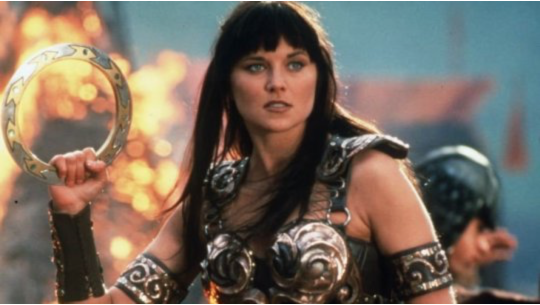
What makes a “great” television show? We all know that there is no single definition, as people have different preferences and experiences, etc. etc. But what are the shows that critics have universally agreed are masterworks of television? The kind that sweep awards shows and influence the direction of entire industry? The kind that your professors uphold as the zenith of television’s potential?
Dark, character-driven dramas. TV’s chock-full of ‘em now, but for the sake of illustration, let’s just use The Sopranos, Breaking Bad, and Mad Men as examples of this phenomenon.
Aside from genre trappings, and writing/directing/acting quality, what do they all have in common? Why do people give so many shits, so intensely, about these shows? What could possibly be at their center?
Answer: A broody, complex antihero with a dark past/present who struggles with the moral quandaries of existence, while remaining simultaneously vulnerable and withholding to both the viewer and those around him. I use “him,” because this character is always male.
Where are all the female antiheroes? Well, there’s at least one who is constantly forgotten, probably because she hails from a wildly different kind of show. One with Greek gods, sword fights, and whooshing sound effects. But don’t let the aesthetics of this show fool you – at its heart, it’s a drama about the redemption of one of TV’s finest antiheroes.
Xena is better than Tony Soprano, Walter White, and Don Draper combined, and I’m about to show you why I can make this audacious (and extremely biased and opinionated) claim!
Let’s take a look at the competition. You’ve got:
Tony Soprano
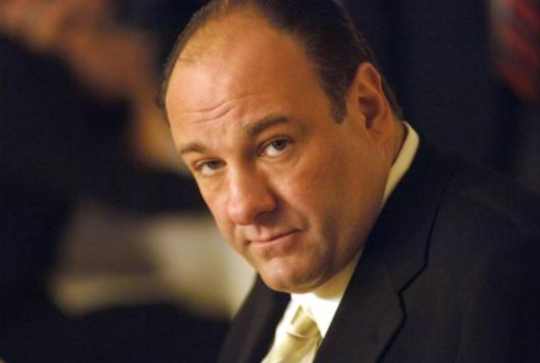
Mob boss with Feelings™. He’s in therapy for the panic attacks he’s been having lately, because this very sensitive man is simply not cut out for the mafia. He’s killed strangers, friends, even his best friend, and he feels real bad about it. At the same time, he’s struggling to maintain the closest relationships in his life, particularly with his family. His kids are growing up, his marriage is strained, and he’s constantly trying to reconcile his brutal, immoral actions with the belief that he could be a good person. Tony wants to be good, but he knows he is destructive force to everyone around him, and the cognitive dissonance is tearing him apart. In spite of therapy, he makes very little progress towards becoming more in touch with his emotions.
Walter White
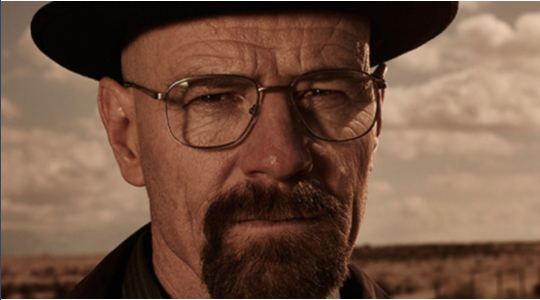
High school chemistry teacher-turned-meth-cook whose entire life falls apart. It starts as a means of paying for his cancer treatment and providing for his family after he’s gone, but when the cancer goes into remission, Walt keeps on cookin’ just because he likes it. I’m not putting words in his mouth; he actually says this. He leads a double life, and, like our boy Tony up there, wants to believe he can be a good person, a good father, a good husband, while simultaneously devolving into cruel, manipulative (sociopathic??) drug lord. Even at the end, when the jig is up and he’s off in hiding, he still wants to provide for his family as some kind of compensation for everything he’s put them through. It’s too little, too late, but we get the idea – he’s a tortured soul, yada yada. Also, Walt, like Tony, is not one for heart-to-hearts with the fam.
Don Draper

1960s ad-man with a dark past, who buries the truth about the tobacco/cancer connection in order to sell cigarettes, and schedules cheating on his wife in his day planner, all while trying to be a good father/person. The most irrepressibly charming guy on this list, Don lives a lie, after stealing the identity of his commanding officer, killed alongside him in combat (whom he may/may not have had a hand in killing). Not even his name is real (Although who wouldn’t pick “Don Draper” over “Dick Whitman?”). He starts the series living the “perfect” life with a wife he plucked from a lineup of models, who, thanks to his closed-off attitude, knows absolutely fuck-all about him. They are in the midst of raising two children before he finally tells her that his father beat him as a child. He’s a stranger to his own wife. That’s how little this guy talks about his feelings.
So why do we watch these antiheroes? They’re shitty people, right? From Tony choking a man to death while on a college tour with his daughter, to Walt watching his best friend’s girlfriend die of a heroin overdose and doing nothing to save her in order to win back complete control of his “friend,” to Don rejecting his long-lost brother who then goes on to hang himself, these guys are Not. Good.
But, they are compelling characters. We have to care about them in order to tune in every week/binge five years of television in one weekend. And as far as I can tell, we like them because they feel bad about what they do. That’s oversimplification, of course, but it touches on the premise that makes these disparate characters somewhat relatable:
We all have done bad things that we regret, and we all need to believe that, at the end of the day, we’re good people.
Enter: Xena

In terms of sheer kill count, Xena has all these tortured main men beaten by a long, bloody mile. I can’t list all of her deeds, but suffice it to say, when Xena begins her journey in the first episode of her series, she’s at Genghis Khan-levels of slaughter. The character of Xena began as a warlord on Hercules’ show, but the whole truth of her villainy is only revealed bit-by-bit throughout the next six years of her journey. She’s killed thousands, razed entire villages to the ground, betrayed those close to her, and essentially been a Really Bad Person for most of her life. It’s arguable, but many see the act of burying her armor in the pilot as a self-sacrificial suicide attempt. Undefended, in a land brimming with uncountable numbers of wronged individuals who would love to see her head on a spike, she’s a lamb waiting for the slaughter.
Enter: Gabrielle
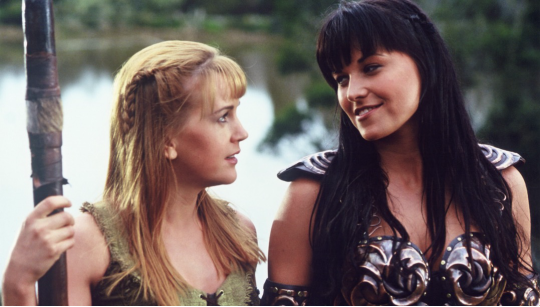
A tiny village is under attack, and in a sudden twist of morality, Xena begins using her combat skills for good. She saves, among others, a plucky village girl who immediately starts following the warrior around like a puppy. But Xena, ever the classic brooding antihero, feels undeserving of gratitude and rejects her. Multiple times. But Gabrielle refuses to be left behind. Xena acquiesces, and the two begin their journey together. Gabrielle’s unrelenting faith in Xena pushes the ex-warlord onto a path of redemption.
Over the course of the series, Xena and Gabrielle spend most of their time walking through forests until someone Evil Xena has wronged stumbles into their path and she and Gabrielle have to face another demon from her past. But no matter how many souls she saves, how many wrongs she rights, Xena never fully accepts that she is a good person. She wants to be good, and she sees goodness in Gabrielle, but always regards it as a quality just out of reach for herself. Her past haunts her, and she doesn’t know if she can ever fully atone for what she’s done.
In addition to undergoing a transformation of purpose, Xena also changes as a person. She begins the first season as a cold, near-Vulcan warrior with an impenetrable exterior and a steely gaze that never totally softens. But with time, and through the force of her relationship with Gabrielle, she chips aways at the wall she’s built around herself until she’s (more of) an emotionally communicative person. She allows herself to be vulnerable, and shares even the darkest secrets of her past with Gabrielle. And although she always braces herself for Gabrielle to have seen too much of the darkness inside Xena and finally leave her, Gabrielle stays by her side every time, and Xena heals a little bit more.
You know what that’s called? Growth.
And it’s hella satisfying to watch.
And, in this definitely-biased lesbian’s opinion, this is what makes Xena a more compelling character than any of the aforementioned male antiheroes. Her story is unique. Tony Soprano struggles with morality, but never truly changes. Walter White gives in to the darkness and lets it consume him. Don Draper reaches for redemption but always falls short. And yes, there is something exciting and interesting about all those stories. As you could probably tell, I’m a huge fan of every show I just mentioned. Hell, I had the idea for this post in the midst of a Mad Men binge at 3am last night. And, for the record, no, I do not hate all men, or all stories about men. But I was wracking my brain for an example of a female antihero in a prestige drama, and suddenly I realized I was looking in the wrong place. And that this would be a completely insane post that could ruffle some feathers online, which meant I had to get it out there on the World Wide Web.
Finally:
You might argue that Xena’s story is so different, and the series itself is so unlike these prestige dramas, that to draw a comparison among these characters is misguided, at best, and totally freaking bananas, at worst.
But, here’s a final breakdown of what these antiheroes have in common:
1. An inner darkness that both drives and troubles them. (Check)
2. A sense of unworthiness towards those who show them love. (Check)
3. A level of charisma/general appeal that invites the audience to give a shit about them, in spite of whatever they might have done/are doing. (Check)
4. A persistent moral greyness. (Check)
5. A preternatural ability to stare into the middle distance and brood. (BIG check)
Clearly, Xena is classic antihero material. But what sets her apart is that she takes action to redeem herself. Even when she doesn’t truly believe she is good, she calls upon all her strength to do good, regardless. Instead of stewing in the darkness, pushing away her loved ones, stagnating in the nebulous state of her morality, she devotes the rest of her life to reckoning with her past and remains steadfastly fixed on redemption. She still makes mistakes. She remains flawed, conflicted, human. But she grows, whether or not she thinks she deserves to. She moves forward.
#come at me#these are my feelings and they are valid#Xena Warrior Princess#Xena: Warrior Princess#xena#xwp#xena/gabrielle#lucy lawless#television#female antihero#women in television#female television#female icons#tv icons#feminism in television#female representation#female rep#female heroes
1K notes
·
View notes
Text
Reflect, and realize your own bias.
Few photographs are powerful enough to change public opinion so vigorously it can no longer be ignored. Charles Moore’s Birmingham, Alabama 1963 photo of police using canines to attack peaceful protesters is that powerful. This image, a part of a series of photos, depicts the violence and aggression used against African Americans during the civil rights movement. Police calmly moving forward appearing to issue commands to their canines. African American protesters moving away in fear; one man having his pants torn by a German Shepard as he tries to escape. This image published in Life magazine shocked the U.S. public and prompted outrage and cries for equality. This photo is a part of our history, a history that in many ways we still struggle with. Moore’s photo depicts the brutality of segregation, racism, and human rights abuse, which must continue to be exposed in impactful and unignorable ways.
The photo, as its namesake states, was taken in Birmingham, Alabama in May of 1963. Birmingham is often considered to be “The Climax of modern civil rights movement…” (Eskew). It started with Fred L. Shuttlesworth, an African American preacher and founding member of the Alabama Christian Movement for Human Rights (ACMHR). Shuttlesworth invited Martin Luther King Jr. and the Southern Christian Leadership Conference (SCLC) to Birmingham to protest the continued segregation in the city. Initially the protests were ineffective at bringing any attention to segregation or even engaging much of the African American community. This changed in May of 1963 when African American youth and children were used to help bring attention to the protests. As hundreds of school children were being arrested and bussed to jails the African American community became enraged (Eskew). Peaceful protests lined the streets, in response the city brought out their dogs and hoses. The intent was to break the community and force the protests to end. Thanks to Charles Moore’s work for Life magazine just the opposite happened.
The incredible imagery that Moore created with this photo, and his series of photos, was not by accident. Prior to being a photographer Moore was in the military and was a boxer but he himself said “-my camera is my tool and I would rather have that be my weapon than my fists any day” (Love). The photo focuses on the divide between protesters and the police, African Americans on the left police on the right. The fear is vivid on the faces of the protestors as a dog tears into a man’s pants. A woman, just behind the man being attacked, holds onto another African American man and stares at the dog in horror. The officer holding the dog looks calm, he has his nightstick in hand ready for the protestors, the other officers appear to be as calm as he does. None of the protestors appear to be violent, none are holding weapons or rocks and yet they are beset with violence. Moore captures this divide so quintessentially that it could no longer be ignored. This photo was intended for the American people to reflect on the question, “What system had they created, and had they become a part of?” By forcing all Americans to confront their moral and fallacious beliefs on human rights Moore was able to compel change. Even now, as technology evolves, we need journalism, photography and reflection to continue eradicating racism in America.
While many believe racism has ended in America they would be mistaken; you don’t have to look far to see its effects. Brian Jones, an educator, activist, and African American male told a story in an article he wrote for the Guardian. He described a scenario at his high school where one of the few African American students found a noose hanging in his locker (Jones). This article was written in 2018, Brian Jones was attending high school in the 90’s, during a resurgence of the civil rights movement. The creation and rapid growth of the Black Lives Matter movement in response to murders of African Americans by Anglo-Saxon Americans is another effect we can witness. Brought to light in the shooting of Trayvon Martin by George Zimmerman, and then spread like wildfire after the death of Michael Brown at the hands of Darren Wilson. Both of these killings were committed at the hands of white men who were never convicted of a crime. Both of the young black men killed were not a threat by all evidence presented. The pattern continued with: Terence Crutcher, Philando Castile, Alton Sterling, Walter Scott, Eric Harris, Tony Robinson, Tamir Rice and many, more. Even more dangerous to the freedom and upward growth of non-white Americans is the use of prison and socio-economic conditions to keep them in a “lower class” than their white counterparts.
The Economic Policy Institute released a report on December 15, 2016 with statistics that should shock any American as it relates to race, imprisonment and socio-economic effects. They found that African American children are six times as likely as a white child to have or have had an incarcerated parent, and that a growing share of African Americans have been arrested for drug crimes, despite being no more likely to sell or use drugs than their white counterparts (Morsy and Rothstein 2). The effects on these children can be life long and significantly affect their future. The report shows that these children are more likely to: drop out of school, develop learning disabilities, misbehave in school, and suffer from a variety of mental illnesses (Morsy 2). It is common knowledge that a whole and healthy family: will have children more equipped for life, will on average earn more salary as an adult, and will have less developmental and psychological issues. An added effect to the incarceration levels is a loss of income in African American communities when one parent is removed. This forces many of these families into low or impoverished states, often in areas ridden with crime and violence. By nature, we begin to believe the African Americans living in these communities are the reason for the crime instead of a wealth of other factors. When we start to equate the area that one lives and works with the person that they are we make grave mistakes. We no longer separate the image of an African American and that of criminal activity; we assume they are criminals by the color of their skin not by the content of their nature. We simply cannot risk furthering the notion that being black is criminal.
The photos that Charles Moore took were a catalyst for changing our view of human rights especially for the African American communities. By taking a photo showing the clear lines drawn, and the calmness and violence used by those in power, he galvanized change. Moore helped to create the support that lead to the Civil Rights Act of 1964 and the Voting Rights Act of 1965. Even as powerful as that message is, we are still mired in racism and classism against our communities of color, especially our African American communities. By continuing to reveal these travesties for what they are and keeping this conversation at the forefront of our minds we can work to end discrimination and racism. In order to do so it must be fought whenever and wherever it presents itself. We can all learn from Charles Moore and continue to fight discrimination peacefully; with our talents, and our voices as opposed to our fists.
1 note
·
View note
Text
So I was having thoughts about a possible Kylo Ren redemption arc again, and why the idea really doesn’t work for me.
Now really, I don’t think it’s going to happen anyway. I think the Last Jedi basically put the kibosh on that concept when it dismantled every bit of Kylo Ren apologia that his fans have ever uttered. But let’s be honest, sometimes creators make very bad decisions. So I suppose it’s still possible.
There’s no way that it can be remotely satisfying though.
The thing about a redemption arc that I think a lot of people miss is that a redemption arc serves a point in the overall story. It’s not just about the character in question. In a way, it’s not even about that character at all, it’s about the role that character plays in the central narrative.
There are main characters and there are side characters, there are allies and there are villains. And ultimately, everything that happens happens to serve the main character(s) story.
Now it is true that some villains are main characters of their stories. Daenerys Targaryen is a good example of this. We followed Daenerys basically from her origin. We saw her grow and change, we saw her defeat and her triumph. We saw her do some amazingly good things and some horribly monstrous ones. The seeds of her fate were planted early on, but there were also plenty of indications that she could go another way. Her fall was tragic (if maybe not the best executed) and we were with her every step of the way.
Kylo Ren is no Daenerys Targaryen and he has never been a protagonist. He’s no Daenerys Targaryen. He’s not even a Tony Soprano or a Walter White. By the time we’re introduced to him, he’s already a monster. He’s already ordering the deaths of an entire village. He’s in the process of murdering an unarmed man. And he’s in the process of hunting one of our protagonists, while another is an enslaved follower.
Each one of Kylo Ren’s appearances in both movies serve to push the actual main characters forward. His massacre causes Finn to rebel. His torture of Poe leads to their alliance and escape. His kidnapping of Rey causes her to learn to defend herself instinctively with the force. His murder of Han fills our heroes with motivating grief and rage. Even in the Last Jedi, while we have lip service to Kylo Ren’s angst and possible redemption, what we really end up with is a plot that shows Rey her own vulnerability and arrogance. He exists, basically, so she can be wrong about him. So that she can be betrayed and return to her people a wiser person.
He is not a protagonist. He’s not a main character. He’s a villain to be defeated. He’s an obstacle to be thwarted. He exists for their stories.
Darth Vader comes up a lot in these discussions. Because of course, Darth Vader is the one who was redeemed. There are a lot of discussions about whether or not Kylo is “better” or “worse” than Vader, when we’re talking about his potential redemption. And I think that’s a bit of a trap. It doesn’t really matter if Vader was better or worse than Kylo, because Vader’s redemption was never really about Darth Vader. it was about Luke Skywalker.
Luke Skywalker started the Original Trilogy with a very clear (wrong) idea about who his father was. (A pilot, war hero.) And soon he had very clear ideas about what a Jedi Knight was. He knew that Darth Vader was the man who killed his father. He knew what he had to do. He blew up the Death Star and saved the galaxy. He went to the ends of the universe on the whim of a ghost to badger his way into training. He fought the most powerful Force User ever, surprisingly effectively for someone with a few days to a few weeks of training. But then he was blindsided by the truth.
Luke Skywalker in Return of the Jedi is a very very different man than Luke Skywalker in A New Hope. He’s older, wiser, sadder and more scarred. And even though Yoda and Obi-Wan have both told him that he has to defeat his enemy, he knows that as a Jedi, he has to do more than that. He has to be more than that. At the pivotal point, he throws away his saber. He reaches his father. His faith and love is rewarded.
That’s LUKE’s triumph. That’s LUKE’s story. It’s Vader’s too, sure, but it’s important for what it means to Luke.
Rey isn’t Luke. If anything, she’s in the opposite position. She grew up with a very different idea of the Jedi. She knew the myth of Luke Skywalker and she knew that he saved Darth Vader. And when he rejected her as a student, she decided that she had to prove herself by repeating his act. She was going to save Kylo Ren.
That was her Cloud City error. That was her equivalent of Luke trying to kill Vader. She didn’t want to save Kylo because he was family. She didn’t want to save Kylo because she loved him. She didn’t KNOW him yet. He was the man who tortured her. She was mislead (by Snoke) into thinking there was something she could reach. And she really wanted to prove Luke wrong. It was ego, and she got hit hard for it when he betrayed her all over again.
Like Luke, Rey was wrong. Like Luke, Rey was injured by it. And like Luke, she’s going to come out of it as a wiser person.
If Kylo Ren does have a redemption arc, that would negate all of Rey’s development in the Last Jedi. Rey was a character for whom everything Force related came easily, too easily by a lot of fan complaints, but that’s why her arc in TLJ was so important. She had to be wrong. She had to learn humility. If she were then proven to be right after all, then she’s got no reason to be a wiser person.
So Rey doesn’t benefit from Kylo Ren’s redemption. Who might?
Leia doesn’t. She had a similar story beat in the Force Awakens. She wanted Han to save her son. He tried and Kylo skewered him. In the Last Jedi, she’s sadder and wiser and when Luke tells her that he will have to fight Kylo and kill him, she accepts that. I’m sure she would be overjoyed to see a Kylo Ren reject the Dark Side, but that’s not the same as an ending to her story. It’s not something that she fought for or earned. (Perhaps things might have been different if she could have a bigger role in Rise of the Skywalker. But unfortunately, her story is fundamentally done.)
It doesn’t benefit Finn or Poe either. Both of them have suffered at the hands of Kylo Ren. And it would make some sense to have a storyline where they have to move past their anger and hate of him. Except, well, that’s not something that the movies have cared to address. When the Last Jedi sidelined both characters, it neatly moved them into plots that had nothing to do with Kylo Ren. Poe is learning to lead (execution of said plot notwithstanding), Finn is coming to terms with his past. Kylo’s irrelevant to the first, and just one face out of many abusers for the second. (It’s more likely that his direct adversary will be Hux, who advocated for the Stormtrooper program that his father started, who hit him and subjugated him directly in TLJ. It’s a much more personal tie than Kylo.) They’d need a whole other movie to establish Kylo’s redemption as being significant in some way to either man.
Han’s story doesn’t benefit. There are those who will claim that he “died for nothing if Kylo isn’t redeemed”. But narratively speaking, he didn’t “die for nothing”. He died to show us that Kylo wasn’t Anakin, and that Kylo wasn’t going to choose his grandfather’s fate.
And honestly, even Kylo Ren’s story doesn’t benefit from a redemption arc. On a narrative level, how would that even work. “Okay, so, I know Kylo has been offered redemption at least three times now and he responded by murdering Lor San Tekka, Han Solo, and trying to murder Rey. The Prequels took the pre-established ending of Return of the Jedi and built a story for Anakin around it. We learned that fundamentally, love and family were at the core of Anakin’s motivation. He fell because of love and he let himself be saved because of love.
But Kylo Ren is OFFERED that kind of love. Han Solo, weeping and unarmed, reaches out to his son only to be skewered. He REJECTS that love. Familial love is not enough.
Rey, a woman that he’s clearly attracted to, makes the same offer. No strings attached. No familial baggage to be an excuse. She reaches out to him, just like every single Reylo-is-canon sort insisted that she should do. And he REJECTS her too. Romantic love is not enough.
There are a lot of debates about whether or not Snoke was abusive, and to what extent he may have influenced Kylo. And certainly the idea of Kylo teaming up with Rey and company to defeat his abuser is an attractive one to a lot of people. Except, well, that actually happens. He and Rey DID team up. They DID kill Snoke. And Kylo Ren ordered his army to stand down, killed Hux when he tried to stop him, and went home peacefully. Wait no, sorry, he took command and doubled down his efforts to murder every last member of the Resistance.
So that means for a redemption arc to work, the writers will have to give us something that is more important to Kylo than family, romantic love, or being free from an abuser to finally reach him and move him off of the path he’s on. Murdering innocent people wasn’t enough, enslaving millions of children wasn’t enough, destroying FIVE PLANETS wasn’t enough.
This isn’t even an Adalind from Grimm sort of situation where her self interest can be used to justify hanging around with the good guys enough to appreciate that they, unlike her previous allies, won’t hang her out to dry. Kylo Ren has literally nothing to plausibly make him want to be a better person.
I can’t say whether Lucasfilms will try to pull off a Kylo Ren redemption arc in the eleventh hour, but I can say that they shouldn’t.
14 notes
·
View notes
Text
Toxic Veins (Alucard x OC): 2 Tears to Blood
Warnings: Violence, Explicit Language, Death
Pairings: Alucard x OC
Word Count: 3549
Summary: It's been 10 years since I've left Hellsing. A little misunderstanding led to my departure, but I was more than willing to leave. Since then, I've managed to make a name for myself. Let's just say, I wasn't joking when I said I would kill every last vampire. Yet, no matter how many I rid, it won't change what's happened.
The past will always haunt me. And now, it's come back. It all truly began, when I met...him.

Life given was hard, as always. The ultimate disappointment. It was a struggle to take in enough air to drive off nightmare sensations of asphyxiation.
I watched as he lay gasping, shaking with the force of effort. My eyes stay glued to his face. Or, what was left of it at least.
"Y-you bitch..." He choked out of the moving muscles that remained intact on the side of the face that wasn't completely blown off.
His eyes rolled down so he could look at me. "I-I'll k-kill you..."
Well, I don't see that happening. Talk to me when you got a face to talk with, pal.
"Really? And how exactly do you plan on doing that when the only moveable parts remaining are your leg, your arm, and your jaw?" His eyes glowed bright red as he looked over at his arm that lay a few feet from him.
"That's what I thought." The smirk that crawled up my face was created from sinister amusement as I stepped closer to his dismembered body. I rose my pistol and aimed it at his heart. "Well? Shall I pierce your heart and put you to rest once and for all?"
He didn't look at me as he started rocking his body until he flipped over onto his stomach and began to weakly, very poorly crawl away. I tilted my head in curiosity. "What are you doing?"
He continued his sloppy crawl until he reached out to his arm. I sighed in boredom as I walked over and stepped on the arm just as he went to grab it.
He looked up at me with a face of so much confidence, but behind those eyes, there was fear.
"This is pathetic. You can't change your form, you can't heal or regenerate your wounds, and now you crawl to your death? You are no vampire." I pressed my foot down on the arm until I heard a satisfying *crunch*.
He flinched at the sound but grunted when I swung my boot and kicked him onto his back, once again aiming the pistol at his heart.
"Why I waste my time on you freaks is beyond me. Then again, everyone needs a hobby." I squeezed the trigger.
"No, wait! P-please!" *bang*
I felt his sticky red liquids splatter across my face, and over my clothes.
I let my gun drop to my side, with my eyes never leaving his as his body disintegrated. After a few moments of silence, I reached into my coat pocket and took out a white box. I plucked a wooden stick and placed it in my mouth, then turned and walked away.
While mindlessly chewing on my match, I reached behind my ear and pressed the small button. "Target has been terminated. Keep me posted if we receive further reports."
'Copy that, Agent Laurifer. You are clear of duty.'
"Well, it's about time." I saw the clearing onto the road as I emerged from the woods. "Maybe now, I'll finally get that vacation-"
*screech*
What the...? I turned around just in time to see a black SUV come speeding down the road and come to a stop in front of me.
I sighed as the doors opened. "Or not."
A group of soldiers packed out and immediately aimed their guns at me. Well, they certainly know how to greet someone. I kept my face neutral as I moved my hand down to where my pistol was.
"Stand down." I froze in confusion when the soldiers put down their weapons and moved aside, with a figure walking through to stand in front of me.
Well, well, well, look who it is. "Captain Chet Brazer."
He looked at me with a smirk. "Ms. Phyre Laurifer, it's been a long time."
"Very long. 10 years now, is it?"
He chuckled. "Yes, far too long."
Silence.
"Well, aren't you going to tell me why you're here? Or are we just going to discuss how long it's been?"
He looked over at another soldier and nodded to him. The soldier stepped forward with a paper in his hand and began to read it.
"Ms. Phyre Cedrica Manchester Laurifer, I have been recently monitoring your skills and believe you are the only person who can properly assist me. This is an urgent manner that must be taken care of and because you are an expert in it, I request your presence. Sincerely, an old friend, Sir Integra Fairbrook Wingates Hellsing."
That name. Hellsing. Integra...
"Sir Integra has ordered us to retrieve you, Ms. Laurifer."
I was silent. I cast my head down, allowing strands of red to cover my face.
"Very well."
I walked ahead, passing through the crowd of soldiers who watched me intently and climbing into the SUV. Chet walked up and got inside with me, before the soldiers. "She's been expecting you for a while now," he said as he pulled out a cigar and lit it.
I said nothing as the doors closed and we drove away.
°°°
The trees glided by, flashes of green passed my view along with pieces of the blue sky.
From the corner of my eye, I saw the soldiers all avoiding eye contact with me. Even the driver's knuckles were white from his grip. They seemed nervous about something.
"Are they always this tense, or are they just shy?"
Chet looked up at them, catching a few of them gulp, then snickered. "Don't mind them. They're just a little nervous being around you. You should've seen their faces when I told them we were coming to get you." He laughed.
I tore my gaze away from the window, which made them tense up, then looked at Chet. "They are afraid...of me?"
He smirked. "Well, to be fair, you are covered in blood."
What? I had to look down and at my reflection in the window to realize I still had the vampire's blood on me. Oh well, it's not my fault they're squeamish.
"Have they never seen blood before? Cleanliness doesn't come in the job description, especially if you need to get your hands dirty." He smiled. "That still doesn't answer why they would fear me." I gazed over them, but they were stiff like boards.
"Can you blame them? From what we've heard, you are definitely a human to fear." I let out a laugh, which apparently made them shiver.
Chet smiled at me, but it soon dropped when my laughter went sour. "Why the hell would Integra want me back?" I looked at him with a frown.
He looked at me in confusion. "Phyre, she doesn't blame you for what happened. It was a long time ago, she thinks of you as a sister."
I slowly nodded my head, then looked directly at the soldiers. "Are you afraid?" My voice boomed. Some of them jumped, but still looked at me. I rose an eyebrow when they stayed quiet. "Well? Answer me!"
They vigorously nodded. Okay, you can stop now. They looked at each other and hardly nodded. Wow, it's a wonder why their heads didn't fall off.
"Good. You should be afraid."
That didn't really calm their nerves, but I wasn't exactly trying to comfort them. I looked back out the window. "But I'm not the only one you should fear," I muttered the last part to myself, but I'm pretty sure they heard because I heard one of them let out a squeak of fear.
"God, you boys are an embarrassment," Chet muttered as he took a long puff of his cigar.
°°°
*Knock* *Knock* *Knock*
Just the thought of being before Integra made me heavily sigh. Chet noticed and wrapped an arm around my shoulders, giving a reassuring squeeze. "Don't worry, I'm sure you'll survive."
I groaned. "Yeah, you can talk."
I heard the footsteps approach the door. Oh no, this is it.
The footsteps stopped and I heard the doorknob jiggle.
Maybe I can still turn back. I looked behind me, but Chet pulled me closer and smiled at me. Damn you, Brazer!
The lock clicked and the knob turned.
I looked at Chet with pleading eyes, mouthing "Don't make me do this".
He sighed and mouthed back "I'm doing this for your own good".
The door creaked open and slowly opened up.
Oh, great. Well, I had a good run, but it all had to end someday. God, if you don't mind doing me this one thing, please just let me disappear!
"Ms. Laurifer, is that you?" I guess he does mind.
I sighed and looked into the grey eyes of Hellsing's Butler. "Yes. Hello, Walter. Well, it's been great seeing you, but you seem busy, so I'll just be on—"
"Sir Integra ordered us to bring her, Mr. Dornez." I turned a cold gaze at Chet, who still had his blasted arm around me!
Walter gave a confused look but still moved aside. "Um, of course. Ms. Laurifer, please do come inside."
I gave an unsure look to Chet and mouthed. "Do I have to?" He smiled, before pushing me inside. My eyes were wide as Chet winked at me and closed the door, leaving me with Walter.
I took a breath and looked at Walter as he began walking down the hall, and trailed behind him.
Silence lingered until he spoke. "If I am being perfectly candid, I did not know you would be arriving. I haven't seen a refreshing face in a while, really."
I nodded. "Well, I surely didn't think of all places, I would end up here this morning."
*bang* *bang* *bang*
I whipped out my pistol and pointed it down the hallway towards the gunshots on high alert. Walter sighed and looked at me. "There's no need for that, miss. It's just our weapons specialist, who apparently is bored."
I looked around cautiously, then put it down. "What is that?" I looked back at him, to see him pointing at my pistol.
"My...weapon?"
He shook his head. "Forgive me, but that is not a suitable weapon for someone with your knowledge and skill level. You don't seem to be exactly living up to your Manchester family name—"
"My name is not Manchester."
He looked up at me. "Well, correct me if I'm wrong, but your name is Phyre Cedrica Manchester Laurifer, is it not?"
I stayed silent and kept my head down. "It's not mine, it's hers."
Walter stared at me, then snickered. "It is your name. Do not be ashamed of who you are. It is the silver cross of Manchester Cathedral - the silver cross that lays upon your neck - that gave Hellsing - that gave man the power to kill these monsters. Despite what your mother may have done, she was a Manchester. And so are you."
I unconsciously touched the silver cross around my neck, smoothing the brand of the Manchester family crest.
"Yes, you are."
My head snapped back, to where I saw the tall blonde woman that wore a similar silver cross around her neck.
She adjusted her glasses and breathed out a long puff of smoke from her cigar. "You are a Manchester, Phyre. Do not forget."
I dropped the cross and stared at her as I put my pistol back in its holster. "Integra."
A small smirk curved around her cigar. "Well, you look like you've been having a grand time. Is the ‘springtime bloodbath’ your new look?"
I looked over at my reflection in the window, and is it possible to look even more bloody than in the car ride? I'm pretty sure I haven't killed anyone else.
"Come on. There is a matter I need to discuss with you." She walked by, leaving a trail of smoke and paused before entering her study to look back at me. "I've missed your blood-stained face around here."
I rolled my eyes, before following after her into the study.
°°°
"It seems you've kept your word in killing all the vampires. And you ignored my warning in not doing anything crazy. Did you really torture a fresh vampire with a handsaw, then proceed to hammer his internal organs over his body to create a ‘real life operation game’?"
I shrugged and leaned against the wall. "He wouldn't cooperate, so I made him."
She entwined her hands and leaned forward. "With a handsaw?"
I rose an eyebrow. "Well, it worked, didn't it?"
She hummed but went silent.
I tilted my head. "I know you're stalling. Why am I here, Integra?"
She stared at me as she reached behind her and dropped a folder on her desk, pushing it towards me. I looked at her, then walked over and picked it up. When I opened it, the first picture I saw wasn't really pretty.
"We've been receiving multiple reports on a string of vampire attacks. So far, there have been 8, and those are the ones we know about."
I looked over the reports, then shrugged and closed it to hand it back to her. "I'm sure Hellsing can manage a few amateurs."
"These amateurs are not just drinking to feed or have fun anymore, Phyre. They are learning, adapting—"
"How?"
"By turning their victims into ghouls."
Ghouls? I scoffed. "Then they are just old fashioned. A true vampire doesn't need rotting corpse slaves to show their power."
"They are using their ghouls to overtake small towns and send their citizens into a wave of panic. It's no longer just about showing their power, it's about using their power to strike fear and cause chaos."
She pulled out another cigar, then stopped and offered me one. I looked at them, then her, before taking one and walking over to lean back against the wall. As she spoke, I took out a lighter and lit it.
"From what I've seen and heard, your skills are remarkable for a human vampire killer. I'm glad you're using your unfortunate gift to your advantage."
I inhaled a long breath and blew out a puff of smoke. "It's kinda funny, considering how much of a negative impact it had when I was young. Never thought it could aid me in my work."
*boom*
Integra shot up from her chair as the door swung open and Walter ran into the room. "Sir Integra."
"What is it, Walter? What is going on?"
Walter glanced at me, then looked back at her. "Sir...he is back and seems unusually happy."
He? Way to be specific, Walter. It's not like I haven't been here for a decade or anything.
Integra rubbed her forehead. "Great. It's never good when he's happy. Did he say why?"
"Actually, he did. Something about having the most wonderful dream and this being a perfect night of enlightenment." Integra hummed in curiosity.
Hello! An oblivious person, here!
"Master." Everyone's heads turned to the dark figure in the doorway.
It was definitely a man.
A man in a red fedora, orange sunglasses and a pair of white gloves for some reason.
He walked forward and bowed towards Integra, who was staring at him. "My master, I have done what you asked." His lips stretched back into a crazed grin.
She tilted her head. "You seem scarcely happy today."
He did a deep chuckle that seemed to vibrate within my soul. "I had the most wonderful dream on my journey back. I cannot wait, for tonight shall be the night I finally—"
He stopped once his eyes landed on me.
ALUCARD
As I marveled in my own happiness and told my master of that dream I desperately wished to be true, my eyes landed on a woman that had been leaning against the wall.
The majority of her outfit was black, but she had a magenta coat, magenta suspenders, and they matched her eyes in a lovely way and a pair of red sunglasses that paired with her red hair, the color of delicate spider lilies, flowing so perfectly down her shoulders.
She was a vision of beauty, and to top it all off, she was covered in delectable blood, and seemed unfazed by it all.
Was I still dreaming? Can such beauty even dare to exist? But she was not just any beauty, no, she was the beauty within my dream. My queen.
PHYRE
Why does he keep staring at me? Do I have something on my face? Oh...right. Oh well.
I took a deep inhale of my cigar and blew a cloud of smoke that flew into his face, but he didn't seem to care.
I looked over at Integra. "It appears he has stopped functioning properly."
She furrowed her brows at him. "Alucard?"
He didn't move but kept his eyes locked with mine as he spoke. "Master, who is this lovely, delectable creature?"
I rose an eyebrow. Delectable? Creature? Do I look like the Cotton Candy Glob to you?
"Alucard, this is Ms. Phyre Cedrica Manchester Laurifer. She is a childhood friend and one of the best expert vampire killers, who is going to be assisting us on the elimination of all our targets."
Alucard? So that's his name. Wait, is he laughing?
"You? A human, an expert? I'm sorry, my dear flower, but there is no human expert on vampires."
Hold on. Did he just call me his flower?
I stared at him. "Really? And why not?"
He smirked and walked closer to me to where he towered over my figure. "Because you're corruptible. By body and mind and soul, you can easily be taken advantage of because you're so fragile." While he spoke I took another puff of smoke.
"A little word of advice, Alucard. Don't make assumptions." I flashed him a smile, then dropped it as I walked over to Integra.
"You were right, Integra, sometimes being a Manchester does have its perks." I looked back at him and eyed the gun in his hand. "It was the silver cross of my family that gives you the power in those 13 mm. And besides, Who says I'm not already corrupted?"
The sound of Integra's phone ringing brought everyone's (minus Alucard's) attention to it. Integra pressed a button and a familiar voice sounded.
'Sir Integra, this is Captain Brazer. We've received reports of a hoard of ghouls going through a small town, originating from the woods. It's urgent.'
I perked up and immediately pressed the button to respond. "Where?"
'Oh! Well, look who decided to stick around. I think someone owes me a thank you next time they see me.'
Seriously?!
"Dammit, Chet, what town is it?"
'Well, there's no need to be rude, Phyre. Now I expect an apology, too.'
"Chet!"
'Alright, alright. It's in Cheddar.'
"Thank you!" I sighed and started walking to the door.
"And where are you going?"
I stopped and looked at Integra. "Cheddar. I thought that part was obvious."
"You are not going alone. This is a matter of Hellsing, and you are a part of us now." She said as Walter placed her coat on her shoulders.
I blinked. Wait, what?
"I don't remember agree—"
"let's go, Phyre. You'll come with me. And Alucard—" She turned to Alucard, who was still looking at me. "You will find the vampire and destroy him, along with his ghouls, am I clear?"
He grinned and bowed his head. "Yes, my master."
I watched her walk out with Walter behind her. Does this count as kidnap? "Phyre, come on!" Yes, I think this qualifies.
As I was about to step out of the room, I realized there was still one person in the room with me. I looked over my shoulder, but all I saw was his eyes boring into me as if looking into my very soul.
Well, someone's got a staring problem.
I quickly turned and left the room to catch up with Integra. I followed her outside towards a chopper that was ready to take off, but then she stopped and turned to look me up and down.
"As original as your new look is, you cannot be seen with blood coating you." By the snap of her fingers, Walter appeared with a hose in his hands.
My eyes widened. "Walter, what are yo—"
"So sorry." The hose turned on and the next thing I know, ice cold water was blasting my face, my clothes, and...other areas.
I tightly shut my eyes with the sound of my teeth chattering when he finally turned the damned thing off!
I opened my eyes and glared at Integra. "W-was that r-really necessary?"
She held a smirk. "Yes, completely. Now, we're even." She tossed me a blanket, then climbed into the chopper.
I sighed and wrapped the blanket around me, proceeding to climb into the chopper. "You replace one shampoo bottle with pink paint—"
"Which took an entire year to finally get out."
"They break their leg while chasing you—"
"Which was completely your fault."
"And suddenly, you're the bad guy."
She shook her head and watched as the chopper rose in the air. "Just follow me and do as I say. You are a part of Hellsing now and that means you listen to me, understand?" I smirked at her, but when she gave me a serious look, it dropped.
10 notes
·
View notes
Note
I've just finished rereading Persuasion and at the end Anne says that listening to lady russell was The Right Thing and it seems really forced. Isn't the whole book about making your own choices and taking some risks? How is submitting to the persuasion right? she was young when she did, of course, but the fact that she says, after eight years of sufferings, that she did the right thing always leaves me confused. what do you think?
I think with Anne it’s not so black and white. We tend to think in terms of “this wasn’t wrong” to then mean “it must have been right” when Anne also elaborates and points out that in her case, it turned out to have been the wrong choice. My reading of it is that she’s saying in the moment, aged nineteen, she did make the best decision she could have made at the time, with the information she had available. Also recall that had Wentworth swallowed his pride a couple of years later and renewed his offer, she would have had the certainty she needed to accept him. So of those eight years of misery, in hindsight, two of those years could be blamed on her choice, and six of them could be blamed on Wentworth’s choice.
Lady Russell’s place in Anne’s life can’t or shouldn’t be minimized. In adaptations, where characters are kind of broken down into their basic note-hitting points, Lady Russell’s position as a neighbourly adviser kind of takes center stage, and in order to highlight Anne’s isolation and unhappiness, she’s often shown as being very lonely. Which she is, in a sense, but she is not alone, nor is she without love. Her family is ridiculous, but Lady Russell is her lifeline, and I don’t think either adaptation really shows that–she’s played off as a meddling but well-intentioned older woman with no perception for Anne’s true feelings. But the text tells a different story. At nineteen, Anne is only five years on from having lost her dear mother, and Lady Russell has stepped into that void and cherished and loved Anne as nobody else has done. Lady Russell has been the next thing to a mother Anne has had as she matured into a young lady, and certainly the best friend in the whole world. Lady Russell is noted as having been a sensible and deserving woman, who helped to guide Lady Elliot, while she lived–and Anne is noted as being very like her mother, in many respects. A superior creature, yes, but everyone can do with a sensible and worthy friend to talk things over with when times are hard.
So here is Anne, at nineteen, with her one consolation and emotional outlet being Lady Russell, who is halfway between a mother and a best friend to her.
[Lady Russell] was a woman rather of sound than of quick abilities, whose difficulties in coming to any decision in this instance were great, from the opposition of two leading principles. She was of strict integrity herself, with a delicate sense of honour; but she was as desirous of saving Sir Walter’s feelings, as solicitous for the credit of the family, as aristocratic in her ideas of what was due to them, as any body of sense and honesty could well be. She was a benevolent, charitable, good woman, and capable of strong attachments, most correct in her conduct, strict in her notions of decorum, and with manners that were held a standard of good-breeding. She had a cultivated mind, and was, generally speaking, rational and consistent; but she had prejudices on the side of ancestry: she had a value for rank and consequence, which blinded her a little to the faults of those who possessed them.
So from this we can determine that Lady Russell has her faults–as does anybody–but she is certainly no evil meddler, and a very worthy friend to have. Her objections to Wentworth as a match for Anne are indeed material–that he has no high connections, and no fortune, but even were Lady Russell not on the snobbish side, these would still be valid concerns. Lady Catherine’s objection to Elizabeth Bennet’s low connections is true snobbery–Eliza has no career to speak of. But in the case of a professional man, particularly in the Army or Navy, a single connection in the right place could be the difference between a life of hard graft and no promotion, and access to wealth and rank. Though the Navy in war-time certainly allowed for more merited promotion than the Army and peace, it is acknowledged that young Captain Wentworth can offer no guarantees for Anne’s support and comfort, and as a gallant young officer, will run the very real risk of injury or death throughout his career. We see the Harvilles living very poorly, though they strive to be happy enough, with the support of Benwick and other brother-officers…and that is with Captain Harville alive, on reduced pay, and still able to do gentle work in mending nets. They are getting by, but only just, and in the best-case scenario. Any crisis–another child born, Harville’s health worsening, some accident or unforeseen cost–can still be the tipping point into abject poverty. This is the uncertainty which rather rightly terrifies Lady Russell on Anne’s behalf, who perhaps has not even thought of these things until Lady Russell points them out to her. Anne has never been married, or really known a married couple other than her parents; Wentworth is a bachelor, and has saved nothing to support a wife and family, though he’s confident enough to propose, anyway.
Anne, being genteel and elegant and high-minded and young, Lady Russell cannot bear to see risking all her happiness on a man who is barely known to any of them. This was very much a whirlwind romance, and now Wentworth is that boyfriend from the other side of town saying “What do they know, babe? Trust me.” If Anne is not persuaded by Lady Russell, she is to be persuaded by Wentworth…so this is less her making up her own mind independently, and more her having to decide who to trust to ensure her future happiness. And Wentworth…Wentworth is not unbiased, here. Sure, Lady Russell has her blind spot of snobbery (but note she doesn’t object to Wentworth the man so much as Wentworth’s career being uncertain and risky and her fears are for Anne’s material style of living being adequate and consistent, rather than believing Wentworth is some stupid peasant who isn’t worthy of a daughter of Kellynch. That’s Sir Walter’s view.) But Wentworth’s blind spot is that he’s deeply in love and all he wants is to be married to Anne. Which, fine…but at what cost? Could his love and his hopes have over-inflated his belief that Everything Will Be Fine well beyond what is reasonable to expect? Lady Russell sees his confidence as foolhardy, perhaps even tempting fate, and it worries her deeply. That Anne eventually sides with Lady Russell causes deep resentment in Wentworth, and rather than understanding Anne’s position and feelings, he leaves the country in a fit of pride which lasts long enough to prevent him renewing his offer two years later.
Now hindsight is 20/20 and we know it’s Wentworth and Anne and true love and all will be well (kinda sorta the risk of injury or death is still there but hey he’s fine for money now) but what kind of mother/best friend figure wouldn’t step in at that point with teenager Anne to be like

Lady Russell, whom she had always loved and relied on, could not, with such steadiness of opinion, and such tenderness of manner, be continually advising her in vain.
So when, in the end, Anne says “I don’t think I was wrong to listen to Lady Russell” it’s a defense of the deep bond and respect she has with her closest friend, and the trust she had placed in her. In the time to come, Anne would learn the value of relying more on her own judgement, yes, and admits that she made the wrong choice in doing precisely as Lady Russell advised (why not settle for a long engagement, instead of breaking it entirely?) she must admit that, given the circumstances, Lady Russell’s caution was entirely reasonable, and that *in general* young people could do much worse than heed the well-meant guidance of older people who have some perspective and loving concern for their well-being. In this particular case, yes, it’s not so simple, and Lady Russell was proven wrong by what, in time, happened…but that’s not proof anybody could have whipped out in 1806 to support Anne and Wentworth’s arguments in favour of the marriage. Wentworth can only hope to make his fortune–he cannot claim with any certainty that he will. His personal convictions are strong enough that he feels able to rely on them, but that’s not enough for Lady Russell, and ultimately, Anne’s doubts work to persuade her, as well. Wentworth resents this, of course, and Anne regrets it…but Anne is doing her best with what she’s got. Should she have ignored her best friend? Specifically, yes, because Wentworth’s gamble prevailed. In general, no.
It was, perhaps, one of those cases in which advice is good or bad only as the event decides…
If Wentworth had died or sunk into poverty, Lady Russell’s point would have been proven. Luck was with him, however, (yes, he is brilliant and brave, but in such a profession one cannot wholly discount the hand of fate,) and he has been raised to wealth and power enough to make Anne and their family secure.
The book, I think, is about weighing risks, rather than simply taking them, and how to best judge and allow the influence of others. Louisa Musgrove is our cautionary tale from the other end of the spectrum–no one can persuade her to do anything she does not wish to do, and ultimately she suffers for it when she is too headstrong and the advice of her sensible friends goes unheeded.
526 notes
·
View notes
Text
Headlines
Arctic records its hottest temperature ever
(CBS News) Alarming heat scorched Siberia on Saturday as the small town of Verkhoyansk (67.5°N latitude) reached 100.4 degrees Fahrenheit, 32 degrees above the normal high temperature. If verified, this is likely the hottest temperature ever recorded in Siberia and also the hottest temperature ever recorded north of the Arctic Circle. The town is 3,000 miles east of Moscow and further north than even Fairbanks, Alaska. On Friday, the city of Caribou, Maine, tied an all-time record at 96 degrees Fahrenheit and was once again well into the 90s on Saturday. To put this into perspective, the city of Miami, Florida, has only reached 100 degrees one time since the city began keeping temperature records in 1896. Verkhoyansk is typically one of the coldest spots on Earth. This past November, the area reached nearly 60 degrees Fahrenheit below zero.
‘A new and dangerous phase’ for the coronavirus?
(NYT) The coronavirus pandemic is entering “a new and dangerous phase,” a top official at the World Health Organization warned. A virus once defined by shifting epicenters is now distinguished by wide and expanding scope: Eighty-one countries have seen a growth in new cases over the past two weeks. Only 36 have seen declines. Beijing and Seoul have had a recent surge; in Florida, Oklahoma, South Carolina and Arizona, daily counts of new cases reached their highest levels so far of the pandemic this week. Texas has seen confirmed cases double in the past month. Some businesses are now readjusting their reopening plans.
Injuries at protests draw scrutiny to use of police weaponry
(AP) In law enforcement, they’re referred to as “nonlethal” tools for dealing with demonstrations that turn unruly: rubber bullets, pepper spray, batons, flash-bangs. Protesters in Denver arrived at the hospital with injuries from police projectiles that caused one person to lose an eye and left three other people with permanent eye damage, said Prem Subramanian, a physician who operated on some victims following demonstrations late last month. “They weren’t accused of any crime, and they came in with devastating eye injuries,” Subramanian said, adding that he was so upset about it that he complained to city officials, who promised to investigate any abuses. “We’re learning the consequences of using these weapons.” He said the injuries rivaled what he saw treating shrapnel damage to eyes of soldiers at Walter Reed National Military Medical Center who were injured by explosives in Iraq and Afghanistan. Rubber bullets and similar projectiles have damaged eyes or blinded at least 20 individuals from ages 16 to 59, according to the American Academy of Ophthalmology, since protests began over the death of George Floyd in Minneapolis.
Statues toppled throughout US in protests against racism
(AP) Protesters tore down more statues across the United States, expanding the razing in a San Francisco park to the writer of America’s national anthem and the general who won the country’s Civil War that ended widespread slavery. In Seattle, pre-dawn violence erupted Saturday in a protest zone largely abandoned by police, where one person was fatally shot and another critically injured. On the East Coast, more statues honoring Confederates who tried to break away from the United States more than 150 years ago were toppled. The statues are falling amid continuing anti-racism demonstrations following the May 25 police killing in Minneapolis of George Floyd, the African American man who died after a white police officers pressed his knee on his neck and whose death galvanized protesters around the globe to rally against police brutality and racism.
End of Venezuela’s Oil Fortune Looms Over Maduro’s Regime
(Bloomberg) Oil revenue, the financial lifeline of Venezuela, is quickly drying up, adding to the growing instability of Nicolas Maduro’s embattled regime. Crude exports that once accounted for 95% of foreign currency inflow to the country tumbled by almost half this month, after hitting a 73-year low in May. The plunge comes as U.S. sanctions continue to target Venezuela, home of the world’s largest oil reserves. Maduro’s regime is already plagued by a humanitarian crisis aggravated by the global pandemic that’s sapping domestic demand for fuels. There’s only one more oil tanker expected to load for the remaining 12 days of the month, documents show. Venezuela used to load two vessels per day two years ago before financial sanctions were imposed. Oil storage tanks in the country are nearly full, forcing operators to shut in production to levels not seen since the end of the Second World War. It’s next to impossible to sell crude to foreign buyers with most oil vessels booked to export crude forced to cancel due to the Trump administration’s sanctions.
Latin America’s Virus Villains
(NYT) Of all the schemes that have siphoned resources from Latin American countries fighting the coronavirus, the body bag conspiracy might be the most brazen. Last month, prosecutors in Ecuador announced they had identified a criminal ring that had colluded with health officials to win a contract selling body bags to hospitals at 13 times the real price. Then one of the men implicated, Daniel Salcedo, fled Ecuador in a small plane that crashed in Peru. Mr. Salcedo is now recovering in the custody of the Ecuador police. Even as Latin America has emerged as an epicenter of the pandemic, with deaths and infections soaring, efforts to contain the crisis have been undermined by a litany of corruption scandals. Dozens of public officials and local entrepreneurs stand accused of exploiting the crisis for personal enrichment by peddling influence to price-gouge hospitals and governments for medical supplies, including masks, sanitizer and ventilators. Some of the gear was so flawed that it was rendered useless—and may have contributed to even more sickness and death. Investigations into fraud have reached the highest levels of government. The former Bolivian health minister is under house arrest awaiting trial on corruption charges after the ministry paid an intermediary millions more than the going rate for 170 ventilators—which didn’t even work properly.
Greece extends lockdown of refugee camps as it allows tourists to return
(Washington Post) Tourists from many countries can now roam free in Greece. But Saturday, the government extended a lockdown of the country’s refugee camps until early July—a move it said is necessary to keep the overcrowded accommodations virus-free. Refugee advocates have criticized the restrictions, extended on World Refugee Day, as an erosion of rights and the wrong approach to keeping people safe. Over 32,000 refugees are housed on Greek islands in accommodations originally built for less than one-fifth the current number of occupants. Thousands more are housed on the mainland. Greek authorities have been moving some asylum seekers out of the island camps and into the mainland facilities but are also ordering out around 11,000 refugees already in the temporary accommodations, leaving thousands on the brink of homelessness amid a pandemic.
India reports record rise in coronavirus cases; Delhi cancels all medical staff leave
(Reuters) India reported a record jump in coronavirus infections on Saturday, a day after the government in the capital New Delhi ordered hospitals to cancel any leave and have workers return to duty immediately. India saw an increase of 14,516 COVID-19 cases, the health ministry said, taking the total to 395,047 with 12,948 deaths. A number of countries continue to evacuate their citizens from India, amid concerns hospitals in major cities such as Delhi and Mumbai may be overwhelmed. Ireland became the latest country to warn its citizens that medical assistance may become difficult with India’s sharp spike in cases and urged them to consider making use of a series of evacuation flights in the next few weeks.
China claims valley where Indian, Chinese soldiers brawled
(AP) China said the Galwan Valley high up in the Himalayan border region where Chinese and Indian troops engaged in a deadly brawl this week falls entirely within China, boldly renewing claims on the disputed area as the Asian giants continued using military and diplomatic channels to try to reduce tensions on Saturday. The confrontation in the Galwan Valley, part of the disputed Ladakh region along the Himalayan frontier, was the deadliest between the two countries in 45 years. India blames China for instigating the fight by developing infrastructure in the valley, which it said was a breach of the agreement of what area remained in dispute. A Chinese foreign ministry spokesman blamed incursions by Indian troops in the area from early May for a midnight clash on Monday that left 20 Indian soldiers dead. China has not said whether it suffered any casualties.
Trying to beat back coronavirus, New Zealand locks out foreign workers
(Washington Post) Jeus Joaquin helped New Zealand beat back the coronavirus as the nation’s confirmed cases gradually fell to zero in May. During New Zealand’s 49-day lockdown, the 34-year-old emergency department nurse treated covid-19 patients at Thames Hospital, on the country’s North Island. Essential workers such as him were lauded as heroes as New Zealand’s international prestige soared. But the win against the virus came at a cost, and Joaquin is among those paying it. His wife and two toddlers are stuck in the Philippines, where the family is from. They are among an estimated 10,000 foreign workers and family members of citizens and permanent residents who were blocked from returning to New Zealand when the country closed its border. It’s now extremely difficult for anyone but a New Zealand citizen—and a few select foreigners—to get into the country, despite the government’s pledges to assist families locked out.
Egypt has a legitimate right to intervene in Libya, Sisi says
(Reuters) Egypt’s President Abdel Fattah al-Sisi on Saturday said his country has a legitimate right to intervene in neighbouring Libya and ordered his army to be ready to carry out any mission outside the country, if necessary.
2 notes
·
View notes